As border crossings spike, local Jewish leaders call for action
Eddie Chavez Calderon lives his life two years at a time. The Arizona Jews for Justice’s campaign director’s status as a recipient of the Deferred Action for Childhood Arrivals program is reevaluated on a two-year cycle.
“The DACA system is basically a Band-Aid that temporarily protects us. And that really sucks,” he said.
Chavez Calderon is one of more than 640,000 DACA recipients. The program was implemented during former President Barack Obama’s administration and allows United States’ residents who were illegally brought to the country as children to remain in the U.S. But not as citizens.
“I’m reminded every day of the hardships of being an immigrant and being semi-undocumented,” Chavez Calderon said. He was four years old when he and his mom walked into Arizona without documentation in 1999. Fleeing violence, they trekked more than 1,200 miles from a rural town in Mexico.
As President Joe Biden’s administration works on new policies to meet an increase in unaccompanied minors crossing the border, Chavez Calderon and others in the Jewish community point out the time for federal immigration reform is long past due.
“Even from the time I migrated, some of the spaces and the facilities used are exactly the same, the treatment of migrants is exactly the same, the vilification of migrants is exactly the same,” Chavez Calderon said. “It’s really sad to see that so many years have passed, and we’re still in the exact same situation.”
Preliminary data from border officials shows the number of people crossing into the U.S. reached its highest levels in at least 15 years in March, according to data reviewed by the
year without hugs, grandparents and grandchildren excited to reconnect
Eva Markowitz, 11, hugged her grandparents for the first time in over a year the week before Passover.
“It feels amazing,” she said. “I miss hugging them because I’m really close with my grandparents and they just make me really happy.”
As more grandparents are vaccinated against COVID-19, long-awaited visits with grandchildren — and the hugs that come with them — are finally happening. More than 75% of Americans aged 65 and older have received at least one vaccine dose, and more than 54% are fully vaccinated, according to Centers for Disease Control and Prevention data released April 6.
Norman and Hana Kahn, Eva’s grandparents, said hugging their three granddaughters was their top priority after receiv ing their second vaccination dose in March. “They had been begging us to hug them and it was really emotional.”
Despite living in Phoenix, only six minutes from their grandchildren in Paradise Valley, the Kahns saw Eva and her two older sisters only a handful of times over the past year. They always wore masks and sat outside, more than 10 feet apart.
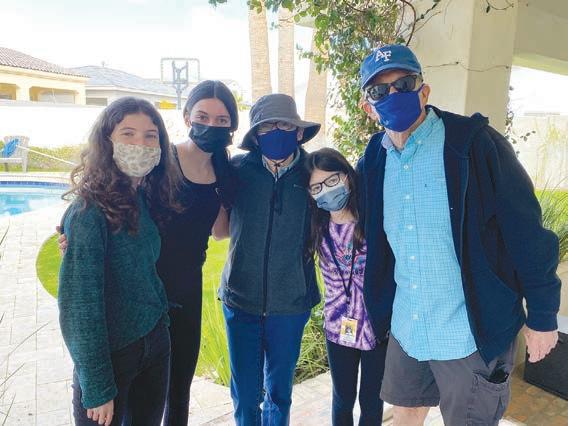
“It was very difficult for us, for them and for everybody,” said Norman, 75. Before the pandemic, he and Hana, 74, would see their grandchildren “almost constantly,” going out to dinner, driving them to school and activities and going away together on vacations.
They weren’t the only ones who keenly felt the distance from their grandchildren due to the fear and social
restrictions the pandemic brought about.
Two weeks after getting their second vaccination dose in late February, Merle and Jeff Leyton drove from their home in Desert Ridge straight to their daughter’s house in North Scottsdale to give her two grandsons, ages 12 and 8, “the tightest and the longest hugs — it was just wonderful.”
Living only about 4 miles apart, the Leytons were always a big part of their grandsons’ lives. Their daughter and son-inlaw both work, and they frequently helped with pickups and drop-offs.
“When COVID came, the world
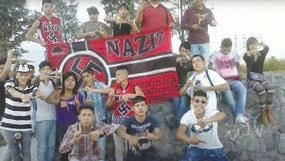
Celebrating b’nai mitzvah despite COVID-19
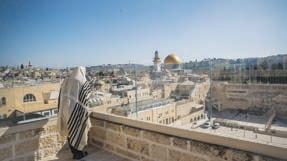

Bar and bat mitzvah students unroll a Torah at Temple Beth Shalom of the West Valley. Even with COVID’s restrictions, b’nai mitzvah celebrations go on. To read more, go to p. 14.
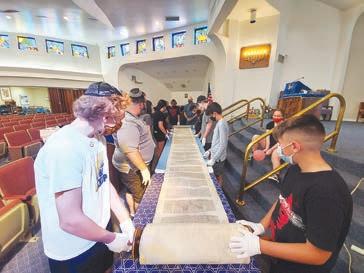

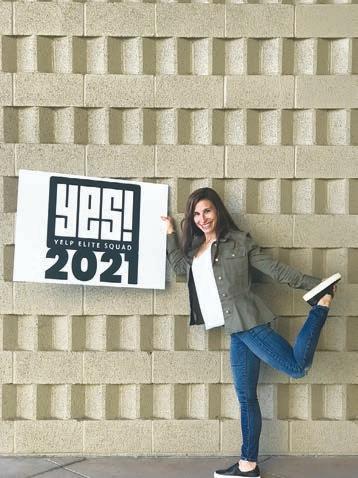
SECTION | 16 CAMP & SCHOOL GUIDE
Camp at The J prepares for summer APRIL 16, 2021 | IYAR 4, 5781 | VOLUME 73, NUMBER 17 $1.50
| 6
SHOULD KNOW
Messinger talks Yelp Argentinian journalist exposes antiSemitic, neo-Nazi groups in Latin America Celebrating Israel’s 73rd birthday on April 15 Delegation of American Jewish leaders to visit Israel in first post-pandemic travel NATIONAL INTERNATIONAL KEEP YOUR EYE ON jewishaz.com
SPECIAL
Shemesh
HEADLINES
YOU
Gabi
NICOLE RAZ | STAFF WRITER
SEE HUG, PAGE 3
After
NICOLE RAZ | STAFF WRITER
SEE IMMIGRATION, PAGE 2
PHOTO COURTESY OF DANA EVAN KAPLAN
Norman and Hana Kahn with their granddaughters.
ISRAEL
PHOTO BY LORI KAHN
Washington Post and CNN.
Local Jewish groups want to see action on the border issue, but have different ideas about what form that action should take.
The Jewish Women’s Conservative Forum’s board members, Lynn Kahn, Laurie Schwartz, Jettie Kootman, Phyllis Kaminsky and Dorothy Gaynor, called the current border situation “an American tragedy” and expressed concern that “drug cartels and smugglers” are the primary beneficiaries of the recent uptick of undocumented people.
“We are deeply concerned by the large numbers of unaccompanied children who are coming into our country,” the board members said, emphasizing that “our laws must be followed and a legal immigration process needs to be restored.”
Speaking at the American Business Immigration Coalition Summit on March 19, Temple Solel Rabbi John Linder called for immediate congressional action.
“Each of our respective faith traditions stand on the common ground that demands we welcome the stranger as one of our own,” he said. “Common sense immigration reform is critical for the economic well-being of Arizona and America. Common sense immigration reform must also recognize the dignity of each human being that comes to America seeking refuge and a better life.”
Linder told Jewish News the conversation about immigration over the past 35 years has “devolved” to become one of the “wedges dividing our country.” The conversation about immigration has largely revolved around border crossings, which isn’t the main driver of illegal immigration.
A report released in 2019 by the Center for Migration Studies of New York found that visa overstays significantly exceeded illegal border crossings. People who overstayed their visas accounted for 62% of the newly
undocumented, while 38% had crossed a border illegally between 2016 and 2017.
Linder, who is also a member of the Valley Interfaith Project and engaged in social justice work with the Religious Action Center of Reform Judaism, helped organize a visit to the Kino Border Initiative in Nogales, Mexico for himself and several Solel congregants in April 2017.
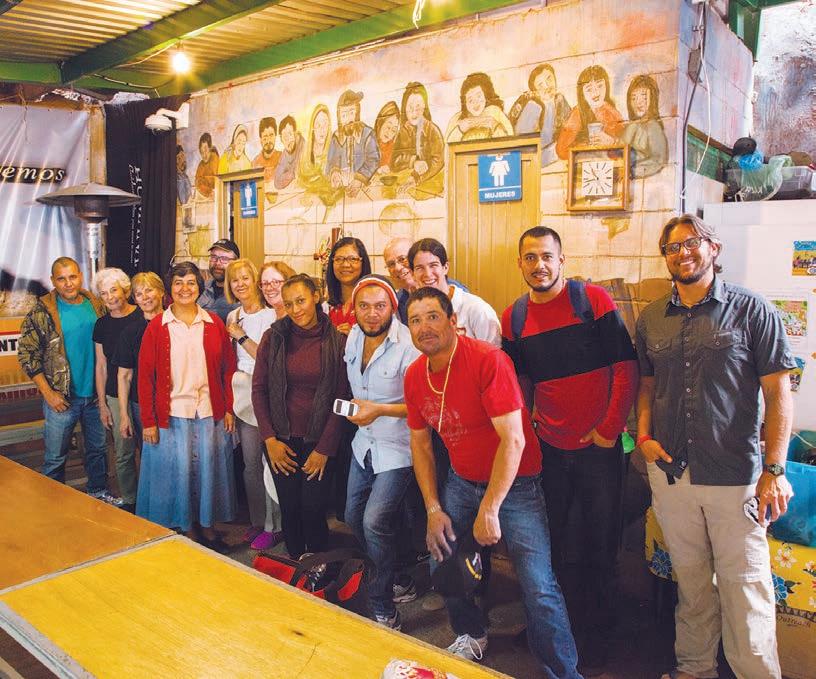
“Since moving to Arizona 13 years ago, and Arizona being a border state, I became much more aware both of the presence and plight of the migrant community,” Linder said. “I was impressed with KBI’s mission that calls for humanitarian aid to migrants, education and advocacy, and wanted the Solel community to experience firsthand what most people only see and read about in the news.”
They listened to families who were living in fear of deportation because of their undocumented status and people fleeing violence in their countries of origin.
“What most resonated and had the greatest impact was the power of bearing witness to people’s stories,” Linder said. “There is tremendous power in the simple act of listening and serving a meal.”
There are currently hundreds of people stuck at the border waiting for their U.S. immigration court date and thousands of others stranded in Mexico because they were immediately deported without due process, said Joanna Williams, executive director of the Kino Border Initiative.
The binational aid organization serves migrants on the Mexican side of the ArizonaMexico border in Nogales by providing food, shelter, clothing, medical services and legal support.
“Thousands have been returned and some people have moved to other places, but others have stayed in Nogales. One of the challenges is that most of the people aren’t Mexican, so they don’t actually have any legal status in Mexico either, for example, to be able to work legally in Mexico,” Williams said.
Navigating the immigration system is complicated and can be confusing even for policy makers, let alone the people stuck in it.
“We’ve seen a lot of harmful policies in the last several years,” said Williams. “We’re also concerned that we don’t see this new administration taking substantial steps, especially to restore access to asylum.”
2021 Phoenix Jewish News Print Dates
May 7
May 21
June 4
July 9
August 6*
August 20
August 27
September 3
September 10
September 24
October 1
October 15**
November 5
November 19
December 3
December 17
*Best of Magazine **Annual Directory
WWW.JEWISHAZ.COM
Chavez Calderon, 25, has been devoted to creating a more inclusive world and standing up for vulnerable communities since he was a teenager.
“Sometimes I really don’t want to talk about this. But then I see the faces of children that are handcuffed, who are seeking asylum here, and I just think to myself, ‘Goodness, we must do something,’” he said.
Jews have a moral obligation to advocate for vulnerable communities, he said. “As Jews, we know what the struggle is of being marginalized and oppressed,” he said.
Even though there are differences in opinions on how best to address immigration with policy, Chavez Calderon said there ought to be consensus about the need for a more human approach.
Solel congregants Rae Rader and Dan
PUBLISHER Jewish Community Foundation of Greater Phoenix
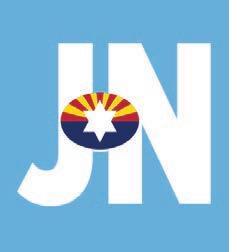

GENERAL MANAGER Rich Solomon | 602.639.5861 rsolomon@jewishaz.com

MANAGING EDITOR Shannon Levitt | 602.639.5855 slevitt@jewishaz.com
STAFF WRITER Nicole Raz | 602.872.9470 nraz@jewishaz.com
ADVERTISING SALES CONSULTANT Jodi Lipson | 602.639.5866 jlipson@jewishaz.com

SUBSCRIPTIONS 602.870.9470 x 1 subscriptions@jewishaz.com
GRAPHIC DESIGNER Frank Wagner | 410.902.2300 ads_phoenixjn@midatlanticmedia.com
|
|
M.B. Goldman, Jr., Founder | 1948-1961
PROUD MEMBER OF

2 APRIL 16, 2021 JEWISH NEWS JEWISHAZ.COM
HEADLINES IMMIGRATION CONTINUED FROM PAGE 1 ©2021 Phoenix Jewish News, LLC, an asset of the Jewish Community Foundation of Greater Phoenix. Awards: Arizona Newspaper Association, Arizona Press Club, National Federation of Press Women, Arizona Press Women, American Jewish Press Association. Member: American Jewish Press Association, Jewish Telegraphic Agency, National Newspapers Association. Jewish News (ISSN 1070-5848) is published less than weekly, by Phoenix Jewish News, LLC, dba Jewish News. A subscription is $48 per year, payable in advance to Jewish News, 12701 N. Scottsdale Road., Suite 206, Scottsdale, AZ 85254, telephone 602-870-9470. Periodicals postage paid at Phoenix, Arizona. POSTMASTER: Send address changes to Jewish News, 12701 N. Scottsdale Road., Suite 206, Scottsdale, AZ 85254. VOL.73, NO. 17 | APRIL 16, 2021 12701 N. Scottsdale Road, Suite 206, Scottsdale, AZ 85254 Phone: 602.870.9470 | Fax: 602.870.0426 | editor@jewishaz.com | advertising@jewishaz.com subscriptions@jewishaz.com | www.jewishaz.com HEADLINES 2 Local OPINION 9 Editorials Commentary TORAH COMMENTARY 11 SPECIAL SECTION: BAR/BAT MITZVAH GUIDE 12 SPECIAL SECTION: CAMP & SCHOOL GUIDE 16 SPECIAL SECTION: HOME DESIGN & REAL ESTATE 18 LIFESTYLE & CULTURE 19 COMMUNITY 20 Calendar Community Milestones OFFICE HOURS 8 a.m.-5 p.m. Monday-Thursday 8 a.m.-12:30 p.m. Friday DEADLINES EDITORIAL: Noon, Tuesday 9 days prior to publication
a.m.,
publication
ADVERTISING: 11
Friday 3 days prior to
Jaime Roberts, Publisher | 2013-2016 Florence Newmark Eckstein, Publisher
1981-2013 Cecil Newmark, Publisher
1961-1981 Pearl Newmark, Editor | 1961-1981
Top Left: Photo courtesy of Gabi Messinger | Top Right: Photo courtesy of Nomi Doherty | Bottom Left: Photo by Yonatan Sindel/Flash90 via JNS.org Bottom Middle: Screenshot via JNS.org | Bottom Right: Photo via Shutterstockvia JNS.org
Silverman visited KBI with Linder in 2017. Rader most remembers the people she met, including some who had just been deported.
“They were let out of the bus and crossed into Mexico and there they are,” she said. “Some of the women were able to get shelter, but the men were just sleeping on the streets, and they were targets of cartels and gangs who thought that because they had come in from the United States, they had money.”
She said her visit to Nogales made her more
just stopped,” said Merle, 74, adding they were “immediately cut off” from in-person contact. “Even wearing a mask, our daughters would not let us get near them. They were really concerned because we are considered seniors,” she said.
They are finally back to watching their grandkids’ baseball games and taking them out for fun activities like mini golf. They even celebrated Passover together in person, instead of on Zoom.
Merle feels like she missed a lot this past year after seeing how much her 8-year-old grandson has grown.
“It’s an emotional experience,” she said, “not being together, and then all of a sudden being together and expressing it.”
The Leytons also have grandchildren out of state, two grandsons in Los Angeles, California. Before the pandemic, they would visit L.A. every three months or so, but only saw them twice over the past year: Labor Day and Thanksgiving.
“My daughter and her family were tested a couple of days before we went there, so we knew we were safe. And we drove, of course,” Merle said. She and her husband plan to visit during Memorial Day weekend.
Sharron and Steve Guttell experienced two very different realities with their two sets of grandchildren. While they felt the longing that came with physical separation from their three grandsons in New York, they were more present than ever with their two granddaughters in Phoenix.
Their granddaughter Cora was born February 2020.
“I saw her at the beginning when she was first born,” Sharron, 70, said. “But then we stayed away until the end of April.”
It took a couple of months for the Guttells to figure out what they needed to do to stay safe. Eventually, they created a bubble with their son, daughter-in-law and granddaughters, who were pulled out of day care.
Sharron retired in May from teaching, sooner than she planned, and helped her son and daughter-in-law look after the kids while they worked from home. She would go to their house in Phoenix, while other days the girls would be dropped off at her house in Scottsdale.
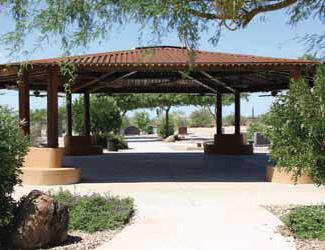
“In one way, it’s been very nice,” Sharron said. “If it wasn’t for COVID I wouldn’t be seeing them every day like this. They’d be in day care and I’d probably still be working.”
The Guttells got their second shots just in time for their grandson’s bar mitzvah in late
aware of the situation at the border and more sympathetic to those making the choice to cross, even without documentation.
Silverman most remembers the visible and profound disappointment many of those at the border carried. The story of what is happening at the border is far different than the one passed down to him from his immigrant ancestors and the one that is common in the Jewish community, he said.
That story is often simplistic and, in many

cases, has a happy ending, he said.
“These people’s stories are not really happy — yet,” he said. “And maybe not ever. That’s an important balance to the more traditional story, especially the story in the Jewish community.”
The pandemic has curtailed in-person visits to the border, but Linder said he and other Solel leaders are in regular contact with KBI and aim to organize another trip after the High Holidays in the fall. JN
plane, but once we were there we felt fine.”
Flying has been completely off the table for Amy and David Korman, who live in Pittsburgh — thousands of miles away from their only grandchild in Phoenix.
But with the CDC declaring April 2 that fully vaccinated Americans are able to travel at low risk of contracting COVID, the Kormans, both 68, have booked their flight.
“We’ve heard that the system they use to clean the air in the cabin is supposed to be good, and it will be more than two weeks from our second vaccine shot, and we’ll be wearing our masks,” Amy said. “We’re not too worried.”
March in New York. They would usually visit at least every three months, but March was the first time they saw their three grandsons in person since October 2019.
“We were going to stay away for the first three days, but we didn’t,” she laughed. “We saw them right away.”
Many seniors are still taking a cautious approach with COVID. The disease has claimed more than 540,000 lives in the United States alone since the beginning of 2020, CDC data show, and seniors account for 80.6% of those deaths. The fear COVID created is hard to overcome, especially as health officials beg people to stay vigilant.
“From the beginning of the pandemic, the scientists said that it was more difficult for seniors — if they got sick — to get better, and we just didn’t want to take a chance,” Merle said. “As time went on, we were afraid to do anything different, and we just felt, ‘Well, we waited all this time, we’re not going to mess up now.’”
The Leytons are happy to be mask-free around their family and grandkids, but they are still not eating inside restaurants. They haven’t decided yet whether they will fly or drive to L.A. for Memorial Day weekend.
The Kahns said they are relieved to be vaccinated after being afraid of the worst-casescenario for so long. Still, they’re reentering society one day at a time.
“I’m still a little apprehensive, but not as badly as before,” Hana said.
“I feel the same way,” Norman said. “Now I’m a little less afraid, but we still want to wait and see what happens.” He’s waiting for more people to get vaccinated before he’ll be able to go back to living a normal life.
Sharron is still getting used to the idea of a new normal. “It was very strange flying and going somewhere after being so used to staying home,” she said. “It felt strange getting on a
They are coming to Phoenix for three weeks in June to see their 11-year-old granddaughter, Lila Cohen.

“Zoom and WhatsApp are very good. But it’s been hard not having her right there with you,” said Amy.
Like other grandparents, they have missed those one-of-a-kind hugs with their grandchild.
When they finally get to see her in person, they are looking forward to getting a tour of her bedroom and watching her show off some new skills.
“She does a lot of arts and crafts, and she always has projects going on,” Amy said. “Plus, she learned how to ride a bicycle a couple of months ago.”
Fredda and Mark Bisman flew from Scottsdale to New York the second week of April to see their grandchildren: one grandson, 12, and two granddaughters, 9 and 5.
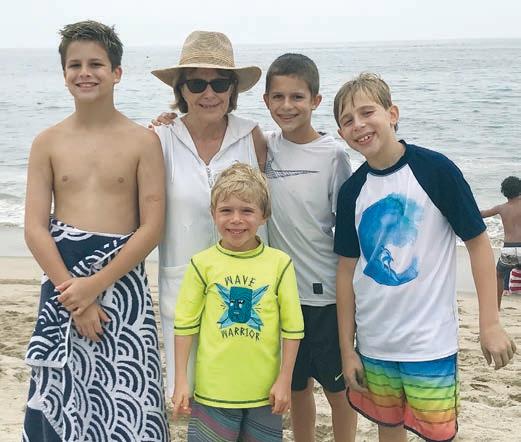
They usually spend the summer in New York and visit for a week or two every two or three months. They last saw each other in March 2020.
Their virtual visits have been “better than nothing” this past year, said Fredda, 74, but nothing compares to being in person.
So far, they have only been reunited at a distance while still masked.
“They go to an in-person school, so we’re not going to see them unmasked or real close until after three days, and then we’re going to have a rapid test just to be sure we didn’t pick something up on the plane that we could transmit to them,” she said.
It’s frustrating being so close and yet so far, but the anticipation for those hugs is only building.
“The relationship between grandparents and grandchildren is really unique and special,” Fredda said. “And so it’s hard to describe what a hug feels like — it’s just the best feeling in the world.” JN
JEWISHAZ.COM JEWISH NEWS APRIL 16, 2021 3
HUGS CONTINUED FROM PAGE 1 A Jewish Cemetery that cares about the Jewish Community • Jewish Owned and Operated • Sidewalks at Every Grave • Caring Professional Sta • Intermarried Families Welcome (480) 585-6060 24210 N. 68th Street, Phoenix (o Pinnacle Peak Rd) mtsinaicemetery.com @ Arizona’s Only Jewish Funeral Home @ Arizona’s Only Member of the Jewish Funeral Directors of America @ Arizona’s Only Jewish Owned & Operated Funeral Home @ Arizona’s Only Funeral Home Endorsed by the Entire Rabbinical Council
Merle Leyton with her grandsons
PHOTO BY JEFF LEYTON
Scottsdale moms say enrolling kids in COVID vaccine trial about ‘bigger picture’
ani Harrison of Scottsdale is risk averse when it comes to her kids. But when she learned Moderna would be starting a trial for a children’s vaccine against COVID-19 in Phoenix, she didn’t hesitate to try and enroll her children,
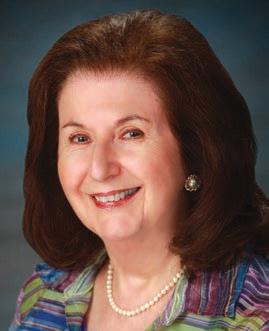
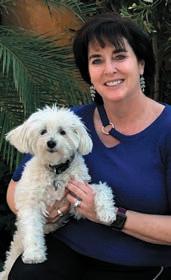



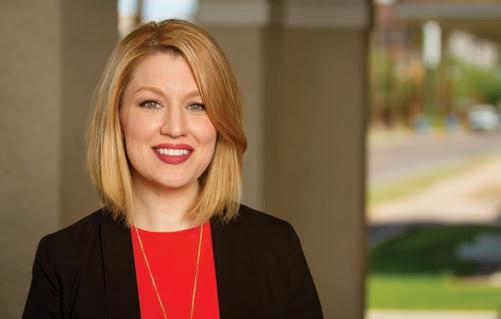
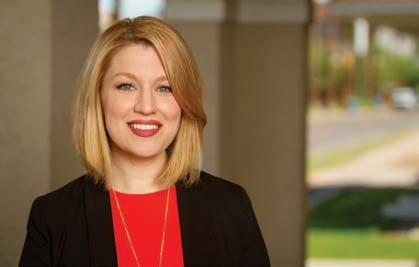

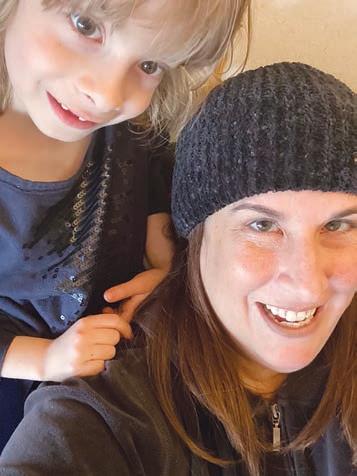
“The side effects might be bad, and people ask why I would do that to my kid,” she said. “But I think of the bigger picture — maybe a fever for a day and then they get to resume their life. It’s a tradeoff.”
Despite her enthusiasm, she hasn’t had any luck getting her kids enrolled.
“I’ve been calling the study and leaving my name,” Harrison said, but there are about 2,000 people who called ahead of her.


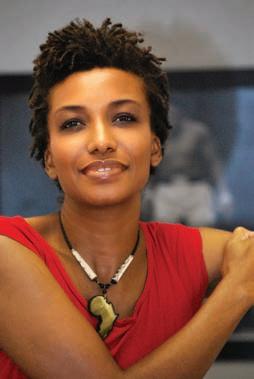
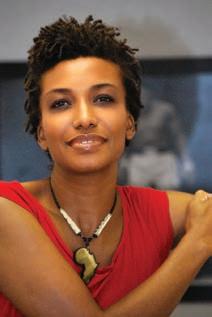

Harrison remains hopeful as she waits for a call back and doesn’t doubt the benefits of a trial. But for Samantha Oliver, another Jewish mom from Scottsdale who called about the trial, the waiting period is letting in an inkling of doubt.
Oliver didn’t tell many people she had signed up for the trial, but those she did simply asked her if she was 100% sure about her decision.
“I’d say now I was about 90% sure it was the right thing,” she said.
She’s resigned to the idea that her 5-year-old son probably won’t get in, and at the end of the day, she’s somewhat relieved.
Oliver’s brothers took part in adult trials last year for the COVID vaccine, and they were repeatedly tested and had their blood drawn. While she was excited initially about the children’s trial and is “very pro-science,” after a few weeks without a response, and given the time commitment and possible discomfort to her son, she's started to reconsider. If she is called now, she can't say what she'll do.
Harrison has done considerable research and knows that those who make it into the trial will be monitored and regularly have their blood drawn. She’s already planning to take the kids for ice cream after any painful pricks.
MedPharmics, a research site in Phoenix, is hosting Moderna’s trial. Healthy children between 6 months and 12 years old are eligible to participate. Dr. Steven Plimpton, the lead investigator for the Phoenix trial, told 12 News that there is a lot of interest from local parents.
Children are less susceptible to the virus by all accounts, but multisystem inflammatory syndrome, a life-threatening

illness that leads to inflammation of the heart, brain or lungs, is a risk. According to the CDC, more than 2,600 children in the United States have been diagnosed with it after a COVID infection. And kids can easily pass the virus to adults who have worse outcomes. There is a growing consensus among health care professionals that to achieve herd immunity, children should be vaccinated.
Harrison moved to Scottsdale with her husband and three children in July 2020 from Los Angeles, California. She recalled a measles scare there in 2015 when her infant son was still too young to be vaccinated. That experience shook her, and since her daughter was born a preemie, she’s very concerned about what would happen if she were to contract COVID now.
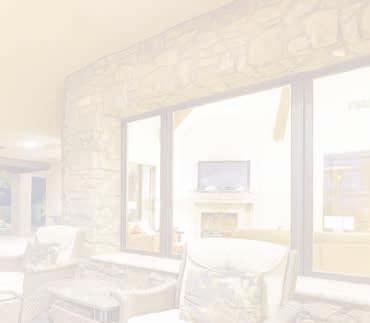
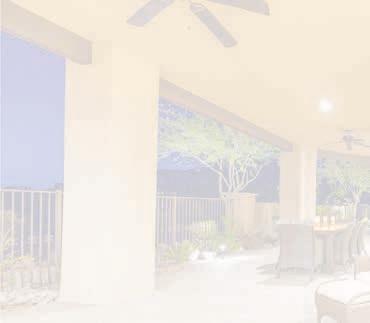
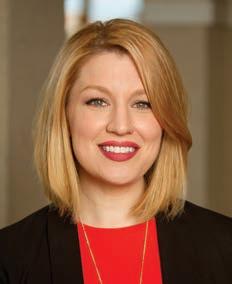
“These are the things that run through my mind,” Harrison said.
Harrison is also troubled when secular people imply that because she’s an Orthodox Jew she must be hesitant about the vaccine.
Nothing could be further from the truth, she said.
“Orthodox Jews, and all Jews, are very pro-science and pro-vaccination,” she said. “We’re not Amish.”

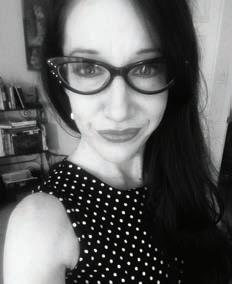
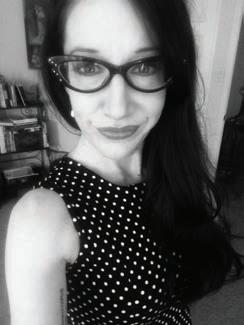


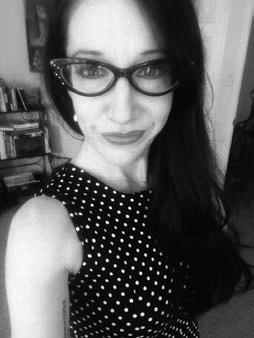
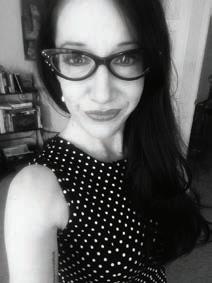

Compared to other groups, Jews have a low amount of hesitancy when it comes to getting vaccinated in general.
An online survey this year by Nishma


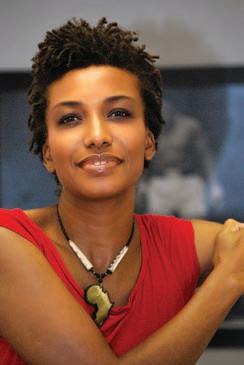




4 APRIL 16, 2021 JEWISH NEWS JEWISHAZ.COM HEADLINES
LOCAL www.rdpoet.com Executive Director, Arizona Commission on the Arts www.azarts.gov Founder, BELLbulletin • L!VEPOET!C www.bellbulletin.com LEADERSHIP IN THE ARTS: HOW TO SURVIVE AND THRIVE TUESDAY, APRIL 20, 6:30-7:30 SPONSORED BY THE WOMEN’S LEADERSHIP INSTITUTE CO-SPONSORED BY The Women's Leadership Institute engages women in building a stronger Jewish community. LEADERSHIP IN THE ARTS: HOW TO SURVIVE AND THRIVE TUESDAY, APRIL 20, 6:30-7:30 SPONSORED BY THE WOMEN’S LEADERSHIP INSTITUTE CO-SPONSORED BY The Women's Leadership Institute engages women in building a stronger Jewish community. Dr. Rosemarie Dombrowski Poet Laureate of Phoenix Founder/Director of Revisionary Arts www.rdpoet.com Executive Director, Arizona Commission on the Arts www.azarts.gov Leah Marche Founder, BELLbulletin • L!VEPOET!C www.bellbulletin.com LEADERSHIP IN THE ARTS: HOW TO SURVIVE AND THRIVE TUESDAY, APRIL 20, 6:30-7:30 SPONSORED BY THE WOMEN’S LEADERSHIP INSTITUTE CO-SPONSORED BY The Women's Leadership Institute engages women in building a stronger Jewish community. Dr. Rosemarie Dombrowski www.rdpoet.com Executive Director, Arizona Commission on the Arts www.azarts.gov LEADERSHIP IN THE ARTS: HOW TO SURVIVE AND THRIVE TUESDAY, APRIL 20, 6:30-7:30 SPONSORED BY THE WOMEN’S LEADERSHIP INSTITUTE CO-SPONSORED BY The Women's Leadership Institute engages women in building a stronger Jewish community. Dr. Rosemarie Dombrowski Poet Laureate of Phoenix Founder/Director of Revisionary Arts www.rdpoet.com Executive Director, Arizona Commission on the www.azarts.gov Leah Marche Founder, BELLbulletin • L!VEPOET!C www.bellbulletin.com LEADERSHIP IN THE ARTS: HOW TO SURVIVE AND THRIVE TUESDAY, APRIL 20, 6:30-7:30 SPONSORED BY THE WOMEN’S LEADERSHIP INSTITUTE CO-SPONSORED BY The Women's Leadership Institute engages women in building a stronger Jewish community. Dr. Rosemarie Dombrowski Poet Laureate of Phoenix Founder/Director of Revisionary Arts www.rdpoet.com Executive Director, Arizona Commission on the Arts www.azarts.gov Leah Marche Founder, BELLbulletin • L!VEPOET!C www.bellbulletin.com LEADERSHIP IN THE ARTS: HOW TO SURVIVE AND THRIVE TUESDAY, APRIL 20, 6:30-7:30 SPONSORED BY THE WOMEN’S LEADERSHIP INSTITUTE CO-SPONSORED BY The Women's Leadership Institute engages women in building a stronger Jewish community. TO REGISTER, PLEASE GO TO THE WOMEN’S LEADERSHIP INSTITUTE’S WEBSITE AT WOMENLEARNING.ORG Let me be your “KOSHER CONNECTION” “I’ll treat you like family, because you are!” Amy Rosenthal 602-430-3158 AmyRosenthalRealtor@gmail.com www.AmyRosenthal.com One of the top 50 Realtors in Phoenix/Scottsdale as voted by Phoenix Magazine! BUYING? SELLING? LOCAL? LONG DISTANCE? Toby Weinstein Broker Associate Full service Real Estate needs, including property management I will make your next real estate transaction pleasant, productive, and profitable. Bus (480) 948-5554 • Cell (602) 228-0265 Tobyre4u@aol.com 7077 E. Marilyn Rd., Bldg. 4, Ste 130 Scottsdale, AZ All Real Estate Agents Are Not Alike!
PHOTO COURTESY OF
HARRISON SEE TRIAL, PAGE 23
Lani Harrison is with her daughter. She hopes to be able to enroll all three of her children in Moderna’s trial for a children's COVID vaccine.
LANI
Arizona mayors sign statement condemning anti-Semitism
NICOLE RAZ | STAFF WRITER AND JNS.ORG
American Jewish Committee and the U.S. Conference of Mayors announced on March 29, that more than 525 mayors across the United States, including six in Arizona, have joined their national effort to combat anti-Semitism.
The two organizations are calling on mayors across the country to sign a statement declaring that anti-Semitism is incompatible with fundamental democratic values.
“Anti-Semitism is a growing societal menace, it comes from multiple sources, and mayors are uniquely positioned to lead their cities in taking concerted steps to fight it,” said AJC CEO David Harris.
The statement, Mayors United Against Anti-Semitism, in part reads: “In a world of global communications, where anti-Semitic ideas spread rapidly, a concerted and principled response is required to raise awareness, to educate and to ensure decency prevails. As mayors and municipal leaders, we have a unique responsibility to speak out against the growing menace of anti-Semitism.”
The mayors of Phoenix, Scottsdale, Chandler, Glendale, Mesa and Tucson have signed on.
Phoenix Mayor Kate Gallego, who is Arizona’s third-ever Jewish mayor, said hate and violence is unacceptable.
“It is critical to combat hate, whenever and wherever it arises,” said Gallego. “It is why I am proud to join more than 500 mayors in signing this pledge, and in actively working to make our nation a place where every individual feels safe, and is treated with dignity and respect.”
Scottsdale Mayor David Ortega pointed out that as a man of color, it is especially important to him to sign the declaration. “I’m the only Latino ever elected here in Scottsdale,” he said, adding he shares the common experience of being targeted by prejudice.
“I’m stepping up to confront this danger to our community,” he said. “I believe government at the local level is the most effective, responsive and accountable.”
Chandler Mayor Kevin Hartke said his signature demonstrates that “Chandler remains committed to being an inclusive, equitable and safe community for all.”
Mesa Mayor John Giles said he wants every Mesa resident to be treated with dignity and respect.
“It’s important to reject any form of discrimination and to stand against anti-Semitism. I was happy to join mayors across the nation, uniting in our support of the Jewish community and to promote awareness and mutual understanding in our cities,” he said.
Representatives for the mayors of Glendale and Tucson did not respond to a request for comment.
Louisville Mayor Greg Fischer, president of the U.S. Conference of Mayors, said his organization has always called on mayors to speak out against hate crimes.
“By signing this statement, more than 525 mayors registered their opposition to the dramatic increase in anti-Semitism we have experienced in our country and pledged to work together to reverse it,” he said.
As part of signing the pledge, the mayors agree to condemn antiSemitism in all its forms, including hatred and prejudice directed towards Jews; stereotypes or conspiracy theories about Jews; Holocaust denial or distortion; and anti-Israel animus that crosses a line to target Jews or deny the Jewish state’s right to exist.
Additionally, the mayors also will support national, state and local efforts to eradicate antiSemitism; reject notions that Israel’s actions can justify or excuse anti-Semitic acts; and affirm that a climate of mutual understanding and respect among all citizens is the bedrock of pluralistic communities.
In 2019, the Conference of Mayors adopted a policy condemning the disturbing and increasing trend of violence towards individuals and institutions based on faith. That resolution specifically condemned “anti-Semitic acts and statements as hateful expressions of intolerance
that are contradictory to the values that define the people of the United States.”
The AJC-USCM initiative comes as incidents of anti-Semitism, some of them violent, continue to rise across the United States, confirmed in FBI reports and AJC public-opinion surveys.
American Jews, who make up less than 2% of the U.S. population, were the victims of 60.2% of anti-religious hate crimes, according to the FBI 2019 Hate Crimes Statistics report.
AJC’s 2020 State of Antisemitism in America report found that 88% of Jews considered anti-Semitism a problem today in the United States, 35% had personally been victims of anti-Semitism over the past five years and 31% had taken measures to conceal their Jewishness in public. JN
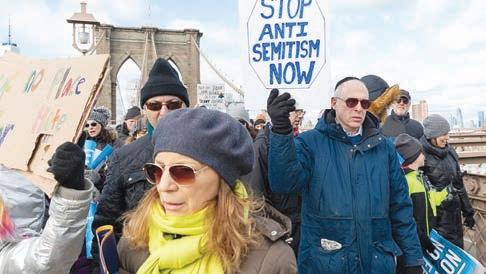
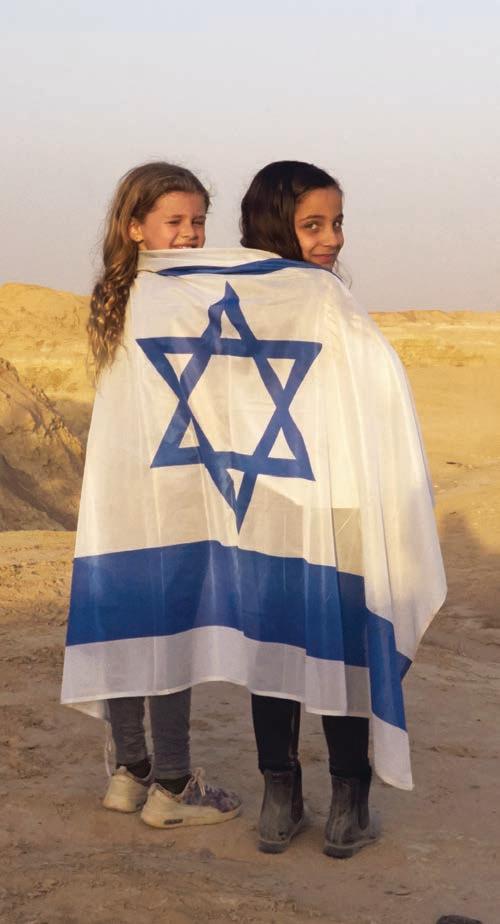
JEWISHAZ.COM JEWISH NEWS APRIL 16, 2021 5 HEADLINES
LOCAL YOU, ME, AND ISRAEL AT 73! Sunday, April 18, 2021 10:30 – 11:30 am PT Featuring guest speakers from the hit Netflix show, Fauda! Register at jnf.org/BFIDesertStates Login information will be sent to you prior to the event. EVENT CHAIRS Nikki Bernstein Bryan Kort Janet & Kent Wellish MORE INFORMATION Leila Mikal, Senior Campaign Executive, Arizona lmikal@jnf.org or 480.447.8100 x987 RSVP REQUIREDNO COST TO ATTENDSPONSORSHIP OPPORTUNITIES AVAILABLE jnf.org 800.JNF.0099
“No Hate, No Fear” Jewish Solidarity March in January 2020. PHOTO BY LEV RADIN/SHUTTERSTOCK VIA JNS.ORG
Call 602-559-8944
CopperPoint Insurance Company has a FT posit. in Phx, AZ for an Application Development Engineer II. Duties incl: devel., design, & deliv. quality solut. for guidewire platform incl. config. of the guidewire policycenter & claimcenter appl.; lead integrations btwn. guidewire policycenter or claimcenter with inter./exter. supporting systems; be both a “hands-on” developer & a lead in deliv. of solutions to meet client needs; Req. BS in Comp. Science, Comp. Engin., Comp. Info. Systms. or rltd & 5yrs exp. Submit Resume by email to careers@ copperpoint.com include job code “JN400”.
You should know ... Gabi Messinger
NICOLE RAZ | STAFF WRITER
Gabi Messinger will know the economy is on the mend when she sees an uptick in Yelp reviews.
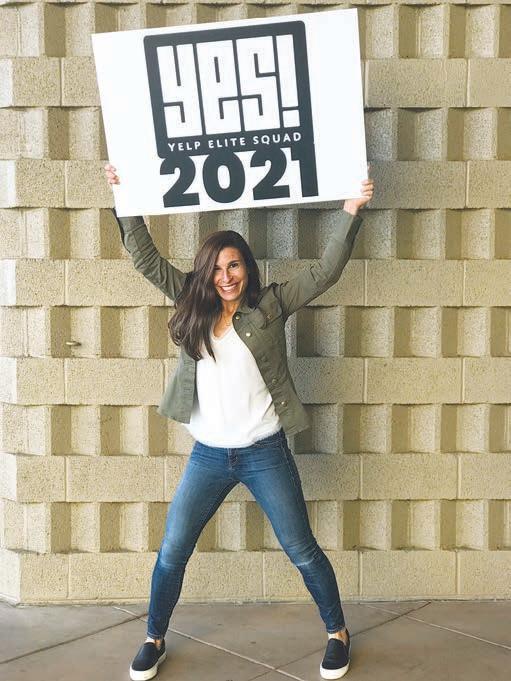
Messinger, Yelp’s vice president of community management, has been with the business review website more than 13 years. She oversees a team of about 100 community managers across the U.S. and Canada who work to support business owners in their communities. The team handles social media, weekly newsletters, marketing partnerships and plans events and perks for Yelp’s Elite Squad — the site’s most active and influential users.
Messinger was drawn to Yelp’s company culture from the get-go. “The people I met in the beginning and the people I work with today are authentic, down to earth, creative and smart,” she said. “They keep me challenged and inspired.” She feels fortunate to work at a company that recognizes the employees’ diverse religious and cultural observances.
According to Yelp, 36.8% of the company’s employee population identifies as part of an underrepresented minority group, and Messinger says “a fair amount” of her colleagues are Jewish.
“I do bring my Jewish self to work in that I make it a point to acknowledge when there is a Jewish holiday and often find myself educating my non-Jewish team members about our customs,” she said.
Messinger lives in Arcadia with her family and spoke to Jewish News about Yelp’s role during COVID and what comes next. What are some things you wish people knew about Yelp?
We’ve become a pretty known brand, but one point that I would make is that we’re really positive and more than just a restaurant review website and app. We’re all about supporting local businesses, and the majority of the reviews on the site are three stars and higher. We are a trusted resource with reviews in many industries from home and local services, automotive, parks, pet-related businesses, hotels, salons, health care and more.
The people that are actually taking the time to post photos and write reviews are mostly positive in nature. All we want to do is really support these business owners, especially now during the pandemic.
How does Yelp support local businesses?
The community team hosts events in support of local business owners, and, pre-COVID, those were in person. Starting in March of last year, we pivoted really quickly and were one of the first companies to start hosting virtual events. We’ve had some really unique virtual events where we brought on business owners and entertainment.
We’ve found ways to support businesses where they can still, in a safe way, sell meal
kits to people so that they can come on and learn to cook with a chef that’s local, or bake cookies with a local baker, or make drinks with a bartender, or do something crafty with their kids and their families with a local store that sells those crafts.
There’s so many ways that we’ve pivoted and kept the community engaged with our brand as well.
What are some social media trends you are seeing that local businesses should be aware of?


Purpose-driven campaigns are really big right now. Everyone just wants to help others coming out of the pandemic; acts of kindness are important. We’re finding that stories and videos are popular, as well as live-streaming on social media. And, for businesses or just brands looking to get out there, the key is brands that are authentic and transparent and uplifting — that have vibrant pictures, unique and memorable content of any kind.
One kind of campaign that my team is working on lately is a “meet the owner” campaign, where they’re really giving the back story of the business owner and how they came to build their business and what the community can do to support them.
Can you speak to the power of a Yelp review?

I would say that our Elites are very powerful. They have a badge by their name and people are seeing their reviews more often when they’re doing their research before they go spend their money. Yelp is so powerful because you can really do your research before you go support a business to make sure you’re going to one that is going to give you a positive experience.
How long does it take for people to become Yelpers?
It really depends on the person and the experience that they’re having. I’d say the majority of our users are just using Yelp as a resource. And then usually, it’s a really positive experience that makes them want to share that with their local community. So that’s when they create their free profile, and post their review or photo. It might be six months after they start using the site, or it might be years later — I hear the gamut.
How does one become an Elite reviewer?
You can nominate yourself or you can nominate someone else that you think is worthy. You need to have a real name and a real photo — which is something that we pride ourselves on because we are real people leaving real reviews. And then there’s a national committee that goes through and decides if they’re Elite-worthy based on the content of their reviews, and it is an annual program.
What do you do about people who abuse Yelp and use it to bash businesses?
I think that is the minority. But we do have fabulous tools available for business owners, where they can really engage folks that may be leaving a negative review, and share their side of the story, either publicly or privately with those users. The people that are using it as a resource can see both sides of the story if they do see a negative review. And not every experience is going to be a positive one, so we definitely see those on occasion.
How have you seen COVID’s impact on Yelp?
With the people staying safe at home, they haven’t been out and about and experiencing local businesses in the same way as preCOVID. As a result, people have less content, fewer experiences to review. But we’re starting to see that increase again, which is really exciting. And hopefully that trend continues, because I know everybody is excited to get back to some kind of normalcy where we can be out and about, and perhaps hopefully soon, revisit hosting in-person events of some sort.
What are some of the things that you foresee coming out of the COVID recession?
Yelp-’s economic data demonstrated the resilience of business owners across the U.S. In fact, Phoenix had nearly 4,500 businesses temporarily close and reopen between March and December of 2020 and I think now we are lucky that we’re in a time that we’re able to support businesses in the Valley, inside and outside with the latest mandates right now. I’ve started to see already how excited people are to go into businesses and go face-to-face with more than one or two people. I foresee more of that to come in the future. JN
6 APRIL 16, 2021 JEWISH NEWS JEWISHAZ.COM HEADLINES
LOCAL
I’LL TUNE ANY
PIANO for only $68.00
BE
follow us! - find- onFACEBOOK facebook.com/JewishAZ - andTWITTER twitter.com/phxjnews
A FAN!
Gabi Messinger holds a sign showing off her work on marketing materials for Yelp.
PHOTO COURTESY OF GABI MESSINGER
Simplifying & Rightsizing Your Home

Thursday, April 22nd • 1:00pm
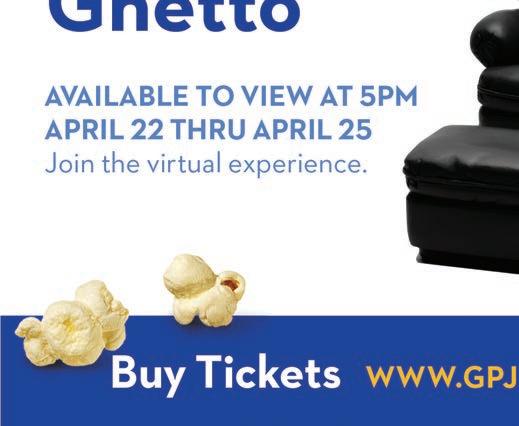
goes virtual
NICOLE RAZ | STAFF WRITER
The Jewish National Fund-USA’s biggest program of the year is coming up this month, and — like everything else in the COVID-19 era — it is going virtual.

The Breakfast for Israel event has been an annual staple since 2003. In a normal year, close to 1,000 JNF members and Israel supporters gather together in person in March to celebrate Israel and learn about JNF-USA.
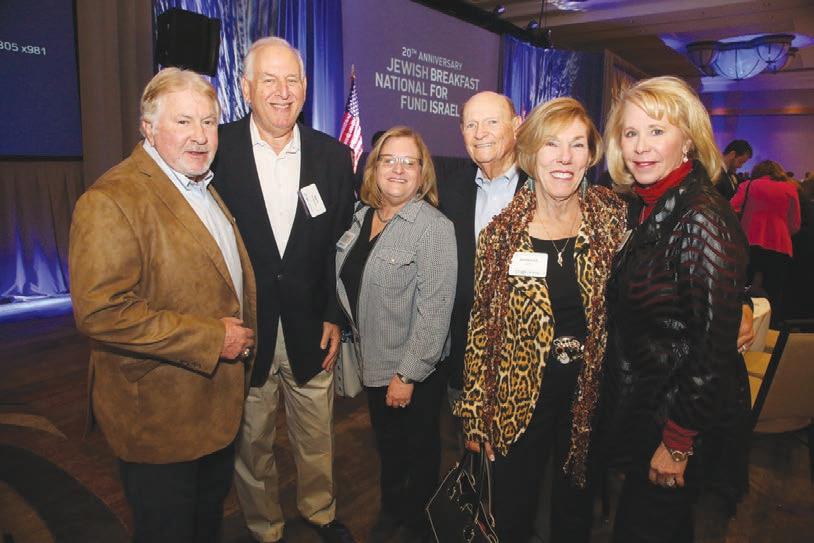
“For some reason last year, out of nowhere, we just decided to move it to February,” before COVID closed down in-person programming, said Leila Mikal, senior campaign executive at JNF-USA’s Desert States. This year, the event will take place April 18 at 10:30 a.m. via Zoom. She isn’t sure how many people will attend, but she hopes to reach people virtually who couldn’t attend in person in earlier years.

“It’s a great way for people who maybe live in Tucson, or remote areas of Arizona, who aren’t necessarily driving to our breakfast every year because it’s very far. They finally get the opportunity to be there with the rest of the community that supports Israel,” she said.
Sixty-seven percent of Jews in Maricopa County are “somewhat emotionally attached to Israel,” according to Arizona State University’s 2019 Jewish Community Survey.
“We really have an opportunity to showcase what our organization does, and it’s free to attend,” Mikal said.
Stars of the Israeli Netflix hit series “Fauda” will be featured at the event, and Yoav Limor, host of a morning show on Israel’s Channel 2 Keshet, will moderate an interview and Q&A session with two of the show’s stars: Tsahi Halevi and Rona-Lee Shimon.
Nikki Bernstein, JNF-USA Breakfast for Israel co-chair and local real estate agent, said she and others are hoping the
“Fauda” feature will be a crowd pleaser. “At a time like this, when people aren’t able to shmooze and connect and be face-to-face, one of the things that have linked us all together is binge watching,” Bernstein said.
And “Fauda” is another way to connect with Israel. “Israel is not only a country or location, Israel is a feeling. And I think Israel, in part, is a piece of who we all are. And with that tie we all feel connected to one another,” she said.
Bryan Kort, co-chair of the event and local businessman, is optimistic about the virtual program, though he will miss the in-person setting. But the most important thing, he said, is getting to know Israel.
“I think people should attend to get a better understanding of Israel and how important JNF is to Israel,” he said.
JNF-USA’s strategic vision is to ensure a strong, secure and prosperous future for Israel. The organization advocates for population growth in the north and south, connecting the next generation to Israel, infrastructure development, ecology, heritage preservation and more.
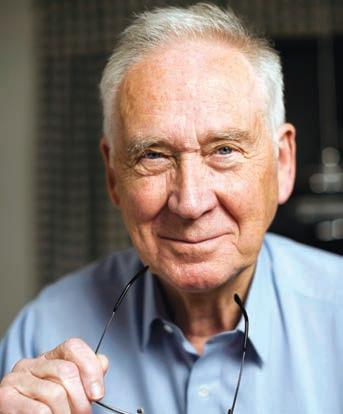
As of Sept. 30, 2020, Jewish National Fund (Keren Kayemeth LeIsrael), Inc. had financial reserves of more than $331.4 million without donor restrictions, or about four times its 2020 annual expenses, which totaled more than $80.9 million. Of the reserves, 63% has been designated by the board of directors for specific uses which include the Boruchin Center for Zionist Advocacy and Initiatives, according to its website.
Mikal said she hopes viewers walk away with a renewed passion for Israel, feeling connected to a place that feels far away.
“We’re really hoping people tune in. It’s going to be less than an hour, it’s going to be fast-paced and a lot of fun,” she said. JN
Join us for a small-group presentation on downsizing and ultimately simplifying your life. Wendy Cracchiolo with Get Your Move On will provide tips for navigating the decluttering process and offer a wealth of information on rightsizing your home. Please call 602.635.2602 to RSVP for this socially-distanced event.
JEWISHAZ.COM JEWISH NEWS APRIL 16, 2021 7 HEADLINES
LOCAL Ask questions. It’s casual. It’s easy. and you’re invited. What can you learn at our upcoming event? A whole bunch.
909 East Northern Avenue • Phoenix, AZ LaSienaSeniorLiving.com • 602.635.2602 CARF-ACCREDITED INDEPENDENT & ASSISTED LIVING 2ND P LACE 2020READERS CHOICE
EVJCC, synagogues partner to host virtual piano recital
The East Valley Jewish Community Center, Temple Beth Sholom of the East Valley and Temple Emanuel of Tempe are partnering to present a live virtual piano recital at 2 p.m. Sunday, April 25.

Elias-Axel Pettersson, founder of Southwest Piano Festival, will perform works by Jewish composers and other monumental figures, taking a cultural tour through time.
“I try to organize events that are bringing the Jewish community together — and one such event is this,” Pettersson said.
Pettersson grew up in a Jewish home and community in Albuquerque, New Mexico.
“I have a connection to the faith and also just to the history and the culture and the traditions surrounding it,” he said. “There is some spirituality in music, and I feel like bringing that to more people is important.”
As an artist and musician, he often creates programs around themes. He began building his repertoire of Jewish music about six years ago.
“When I play for synagogues or JCCs, I always get asked, ‘Can you play Jewish music?’ And I’m always a little confused by that,” he said. “When I play at other organizations or churches I’m never asked to play Christian music.”
He decided to define Jewish music by a piece’s composer, and he was happy to learn that Felix Mendelssohn, a German composer,



pianist, organist and conductor, was Jewish.
“Mendelssohn has been very, very famous to me,” Pettersson said. “I played some of his pieces as a kid.” But he only discovered that the composer was Jewish several years ago. He will perform Mendelssohn’s “Rondo Capriccioso, Op. 14” on April 25.
“It’s nice to get some of these pieces out in the public and heard more often,” he said.

The EVJCC, TBSEV and Temple Emanuel are providing this event for those who are missing live concerts during the COVID19 pandemic and to raise funds for those in the community who are experiencing financial hardship, the three groups said in a joint statement.
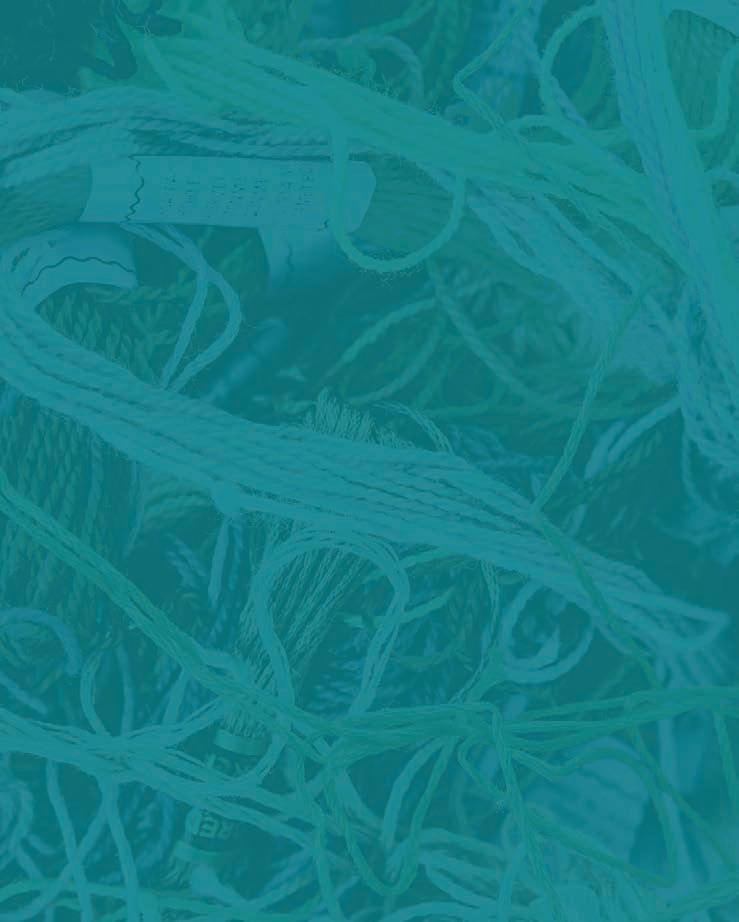





The concert is free, but donations are being accepted to help those in need. Registration is required. To register, go to tbsev.org/ 2021-piano-recital.
Chabad rabbis in Arizona work with mayors to proclaim Education and Sharing Day In March, Marana, Oro Valley, Prescott and Scottsdale were among other Arizona towns and cities that proclaimed Education and Sharing Day for the first time.
The day recognizes the work of Rabbi Menachem Mendel Schneerson, who emphasized the crucial importance of ethical and moral education as well as the importance of giving. Every president since Jimmy Carter in 1978 has made an Education and Sharing Day proclamation.


“Education must be more than factual

enlightenment — it must enrich the character as well as the mind,” said President Ronald Reagan in his 1982 proclamation for the day, echoing Schneerson’s sentiments.
The Chabad Lubavitch movement has been making a point to have local jurisdictions recognize Education and Sharing Day, and its rabbis worked with mayors to make it happen this year.
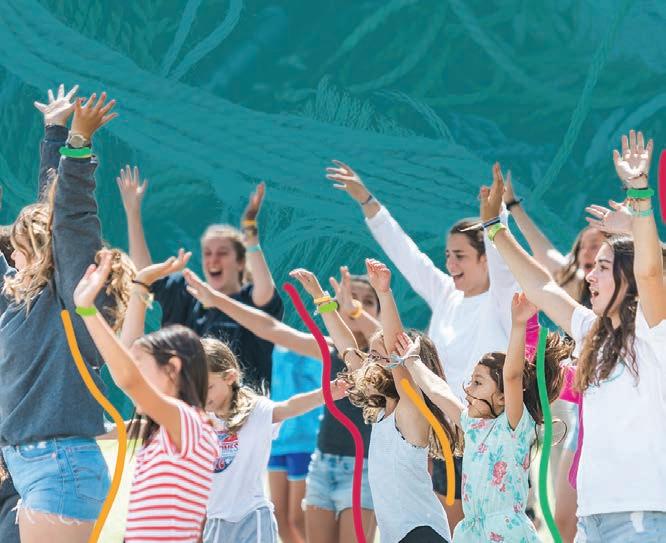
In a first for the city, Chabad of Scottsdale Rabbi Mendel Vaisfiche worked with Scottsdale Mayor David Ortega to proclaim March 24, 2021 “Education and Sharing Day.”
“It’s an important thing, especially with this past year being not the best year for education. Schools have been closed and it’s been quite a challenge,” said Vaisfiche.
Schneerson encouraged the widespread adoption of a moment of silence in schools for observing Education and Sharing Day. He hoped children would ask their parents what they should be thinking about during that moment and open a conversation about values and choices in behavior.
Observance can take many forms for an individual.
“Anything is a win,” Vaisfiche said. “Whether it’s teachers putting in more effort, parents putting in more effort — even a thought about it.”
Chabad of Oro Valley Rabbi Boruch Zimmerman worked with Marana Town Clerk Cherry Lawson and Oro Valley Mayor Joseph Winfield for Education and
Sharing Day proclamations on March 16 and March 17, respectively.
“To me the difference between local and just state or federal is that’s where something really gets relevant,” Zimmerman said.
Chabad of Prescott Rabbi Elie Filler worked with Prescott Mayor Greg Mengarelli to proclaim the day on March 24.
“We live in a time that education is very available, but a lot of time it is focused on academics and not ethics,” Filler said. “And that’s something that has to be passed on to the next generation.”
Jewish National Fund merges two chapters to create Desert States
The Jewish National Fund merged its Arizona and Nevada executive boards over the summer to create the Desert States board.
Leila Mikal, the organization’s senior campaign executive for Desert States, said the decision to merge was a result of the pandemic.
The COVID-19 pandemic halted travel, creating a challenge for JNF to engage with its Israel supporters in Nevada, where there is no full-time JNF professional.

“We really wanted to bring our Las Vegas lay leaders (volunteers) and Israel supporters more into the fold, so we decided to merge the two boards of directors into one,” she said. “Collectively, as Desert States professionals, we are ensuring that they stay connected to Israel and connected to JNF-USA.”


The merger had a limited impact on donors and volunteers, she said. JN




8 APRIL 16, 2021 JEWISH NEWS JEWISHAZ.COM BRIEFS
LOCAL Contact Jodi Lipson at 602-616-0697 to schedule your advertising. jlipson@jewishaz.com • jewishaz.com Place your ad in the Jewish News DON’T MISS OUT! This year, we focus on the best healthcare the area has to o er, from doctors and nurses to pharmacies and hospitals. BEST OF… Healthcare Magazine Publishing August 6, 2021 SUMMER 20Twenty-FUN at Scripps College Sign up for an online open house! wbtcamps.org/20fun Safe, Fun, & Meaningful
Toward Palestinian aid with purpose
The Biden administration’s decision to resume financial assistance to the Palestinians is a sound humanitarian move. It is important for America to reaffirm its commitment to helping those in need, and much of the Palestinian population clearly qualifies. What’s more, American aid has been used to help encourage the normalization of relationships between Arab countries and Israel. So Palestinian humanitarian support makes even more sense — particularly if it is used strategically, to help encourage parallel diplomatic efforts directed toward some form of peaceful co-existence.
Unfortunately, the Biden team appears so anxious to move forward with the effort that it missed some steps in the process. It announced a significant initiative with a large price tag, but has not explained the details of the undertaking, and has ignored some seriously complicating factors.
The administration began this process two weeks ago, when it announced a grant of $15 million in coronavirus assistance in the West Bank and Gaza. It then added $75 million in assistance for infrastructure, health and civil society groups, and an additional $40 million for law enforcement and security costs. Then, dwarfing them all, came the announcement last week of another $150 million in humanitarian assistance for the U.N. Relief and Works Agency that serves Palestinian refugees and their descendants. It is that last piece that gives us pause. The grant to UNRWA without meaningful conditions and controls is ill advised.
For decades, UNRWA has been careless, corrupt and deeply involved in an array of
anti-Israel activities. The Trump administration withdrew support for UNRWA precisely because of those concerns. Since then, nothing about UNRWA has changed. As such, pouring $150 million U.S. tax dollars into a relief plan through a corrupt and wholly unaccountable international agency makes little sense.
There has to be a better way. It may take a little more time and a lot more effort, but an alternative approach could help assure that U.S. humanitarian funding is directed faithfully and honestly to those it seeks to assist, rather than through a UNRWA structure that is severely compromised, of limited effectiveness and whose agenda is inconsistent with our principles and concerns.
The West Bank and Gaza are very small territories. It is not difficult to determine which existing social service and community agencies within their borders are providing effective direct services that address poverty, hunger, health concerns and meaningful education needs, while not promoting the corrupt and morally compromised political agenda of UNWRA, and are not tied to the hateful goals of Hamas.
We are proud of the administration’s effort to provide needed assistance to the Palestinian people. But we oppose providing those funds through the dirty funnel of UNRWA. At least until UNRWA cleans up its act, the administration should take the time to do this right, without the UNWRA overlay. Such a focused effort will be more helpful to Palestinians in need, and could help promote efforts toward a peaceful resolution with Israel. JN
Vaccination: A Jewish value
RABBI JEFFREY LIPSCHULTZ
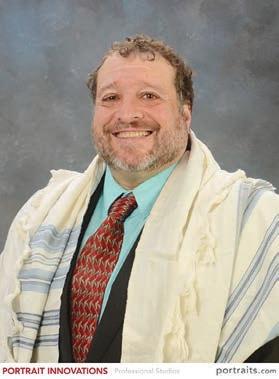
he first vaccine I received was in early January at a drive-thru vaccination center at Banner Del E Webb Medical Center in Sun City.
Because I am a hospice rabbi for Madrona Hospice & Palliative Care, I was lucky to receive it early.
My boss worked hard to include hospice chaplains and social workers to be first in line to receive the new vaccine with all other
Manchin in the middle
Six months ago, it would have been difficult to imagine that a United States senator serving in just his second term, from a state with fewer than 2 million residents, would emerge as the second most powerful politician in the United States. Yet today we find that virtually all legislative action in Congress depends not on Majority Leader Sen. Chuck Schumer (D-N.Y.) or Minority Leader Sen. Mitch McConnell (R-Ky.), and not even on House Speaker Nancy Pelosi (D-Calif.), but on Joe Manchin, the moderate-toconservative Democratic senator from West Virginia.
Manchin has become the Senate’s fulcrum, with his crucial swing vote sought by Democrats eager to pass their far-reaching legislative agenda, and Republicans desperate to stymie what they believe to be extreme overreach by the opposition.
Manchin stands out in an evenly divided Senate in which the votes of virtually every other member can be counted on to support the party line on most issues. So, with a 50-50 split, one renegade, on either side of the aisle, can make a difference. And for the Democrats, that “renegade” is Manchin — who has already blocked President Joe Biden’s nominee to run the Office of Management and Budget, has forced congressional Democrats to make changes to the economic stimulus bill in order to get his vote, is opposed to raising the minimum wage to $15 per hour, opposes a mandate of background checks for most gun sales, and has drawn a line in the sand in his opposition to proposed changes to the Senate’s filibuster rules.
Manchin claims that he is beholden to no one but West Virginia voters, the American people and his convictions. And the independence he has shown in the face of extraordinary pressure to support the party line seems to indicate that he is telling the truth.
Manchin says he wants to encourage bi-partisan engagement and debate on significant legislative issues, rather than allowing rank partisanship and legislative gridlock to continue. And it appears that he is already achieving some success. For example, early reports indicate that Biden’s first bipartisan congressional meeting to discuss his $2 trillion infrastructure bill was designed, in part, to enable advocates to tell Manchin that the president tried the bipartisan approach and failed — in the hope that Manchin would appreciate the effort and reward it with his supportive vote.
Prior to the 2020 election, and particularly before the Georgia runoff Senate votes in January, we expressed support for the idea of a “divided government,” because it would encourage negotiation and compromise in order to get most things done. While that didn’t happen, and Democrats now “control” the White House and both houses of Congress, Manchin seems to be single-handedly changing the calculus and forcing that very engagement on issues in a way that presents a welcome opportunity for Democrats and Republicans to work together for the clear benefit of the American people whom they have been elected to serve.
That’s a good thing. JN
health care workers. Chaplains are considered nonessential medical workers and are denied entry to most group homes and nursing homes for fear of spreading the virus.
This past year has been frustrating for rabbis and chaplains who specialize in the personal connection between patient and family and their clergy. The vaccine I received gives us a chance to end the isolation patients experience. It gives us an opportunity to be in person with those who need that connection before they go to the next world.
I have been a rabbi for almost 20 years and I can’t count how many times I have sat with a family or an individual holding their hand
as they struggle with the fear of life's end. Sitting at bedside with even an unconscious loved one is an essential part of the mourning process. Many times when a congregant called me to give the last rights, the moment I arrived would often be the moment the patient would take their last breath — almost waiting for a rabbi’s permission to enter the world to come.
Not to physically touch the person and say goodbye is a painful part of this tragic year. The vaccine is now a signal that we can start to reconnect to one another. Quarantine has been hard, but part of our Jewish values is to protect the community.
A NOTE ON OPINION
This is considered a great mitzvah. When Miriam was afflicted with tzora’as (leprosy) after speaking lashon harah (evil gossip), she was told by God to separate herself from the community outside its camp for three days to allow herself to heal but also to protect the community around her.
The preservation of physical well-being is looked upon in Judaism as a religious command. Concerning our mitzvot we are told: “And live through them, but not die through them” (Yoma 85b, based on Lev. xviii. 5). It was the principle applied to all the laws of
JEWISHAZ.COM JEWISH NEWS APRIL 16, 2021 9
OPINION Editorials
Commentary
SEE
We are a diverse community. The views expressed in the signed opinion columns and letters to the editor published in the Jewish News are those of the authors. They do not necessarily reflect the views of the officers and boards of the Jewish Community Foundation, Mid-Atlantic Media or the staff of the Jewish News. Letters must respond to content published by the Jewish News and should be a maximum of 200 words. They may be edited for space and clarity. Unsigned letters will not be published. Letters and op-ed submissions should be sent to editor@jewishaz.com.
LIPSCHULTZ, PAGE 10
the Bible, from which the rabbis deduced that in case of danger to life, all laws except those against idolatry, adultery and murder might be violated.
The neglect of one’s health was regarded as a sin; and the Nazarite who vowed to abstain from wine and was in isolation was considered a sinner, as well as he who fasted or underwent other penance without reason. The idea is that we are not allowed to deprive ourselves and be in isolation without a very
specific reason, and the highest of those reasons is the safety of our community.
Zoom has been a help during this time as our community tries to connect over screens. But Zoom is no replacement for the physical connection we crave during a time of crisis. I have done some amazing things on Zoom, from last rights to Taharah — the cleansing ceremony before burial, but the vaccine offers something special: a chance to return to the physical connections people need as they face the end-of-life crisis.
The second shot I received meant more than just hope for me to return to the
normalcy of my job. It was a chance for the community to have a collective hug that we so badly need. I truly believe this vaccine is a religious duty for all in our community because, just as we need time to separate for physical healing, we also need time to return to the physical connections that help heal us spiritually.
We all need to take this vaccine seriously, and all in our community are strongly encouraged to get it. The Talmud states that all of Israel are responsible for each other (Shevuot 39a). This is the basis of the notion of communal responsibility in Jewish law. If
The small country with a big heart
RABBI REUVEN MANN
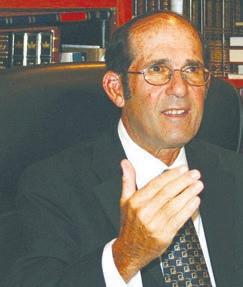
his past year has been one of hardship, suffering and death for many people across the globe. The COVID19 pandemic did not discriminate along racial or religious lines or issues of personal background. Having faced the same danger together, hopefully we have achieved a new sense of respect and tolerance for all people.
My wife and I arrived in Israel just prior to the onset of the virus in early March 2020. We managed to celebrate Purim “normally” but the restrictive measures were then put in place. Israel took the crisis very seriously and went into full lockdown mode. This meant that the most public institutions such as businesses, shopping malls, restaurants, schools
Tand even synagogues were suddenly off limits. Indeed, one was no longer free to even go out for a long walk as the distance one might traverse from one’s home was severely limited. This impacted me as walking is my prime form of exercise, which I take very seriously. I usually walk between 5 and 7 miles a day, which in hilly Jerusalem constitutes a significant workout. But this draconian measure was soon modified. A new rule was added saying that those who needed to walk for exercise or medical reasons were permitted.
The restrictions had a telling effect on the economy and personal lives of people. As Passover arrived the practical and psychological effects of the new reality were in effect. Put simply, this is a time when people expect to celebrate together with family and close friends. Suddenly that privilege, which we had always taken for granted, was gone. That proved to be a serious hardship, especially for the elderly, many of whom lacked a spouse
and had to celebrate the seder alone. This was a prospect they had never dreamed of.
Israel is a can-do country that thrives on challenges. In addition, it has a very heightened sense of responsibility for the well-being of its elderly population. Signs on buses contain Torah quotes such as, “In the presence of an old person you shall rise.” The society has a deep sense of concern for people in need and goes out of its way to facilitate their well-being.
Thus, the Jerusalem Municipality made phone calls to all people over a certain age asking how they were doing and what assistance they could use. They made sure to procure their medicines, food supplies and other basic requirements and have them delivered. This proved to be a great blessing for this population in both a practical and psychological manner.
The virtue of social concern was manifested in other ways. Passover and the other
one Jew sees another Jew in crisis, he or she has an obligation to step in and help.
Even more so, it implies an obligation on all Jews to ensure that other Jews have their basic needs for food, clothing and shelter met. That also includes social connection.
This is the core of our faith and this vaccine is more than a personal act of health care. It's a communal responsibility for religious healing and I urge all to take the shot — not just for yourself but for all in our community. JN
Rabbi Jeffrey Lipschultz is the staff rabbi for Madrona Hospice & Palliative Care.
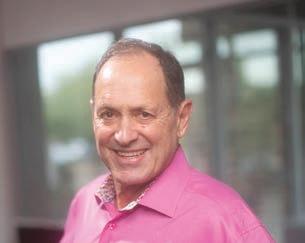
holidays were challenging because of the social isolation. But the Israeli spirit shone forth. Word went out that people were invited to go to their windows at a certain time and join together to sing the “Ma Nishtana” (Four Questions). At the designated moment we opened our window and joined many neighbors in this chant. It provided a meaningful sense that we were not alone. We were together with many others in the celebration of Passover.
The same spirit shone forth in other religious observances. When synagogues were closed it did not prevent people from having minyan services. Suddenly outdoor ad hoc prayer groups sprung up in courtyards, terraces and on street corners. One could simply walk down the street and — retaining mandatory distancing — participate in prayers. This was extremely important to many people,
Making and keeping friends in the time of COVID-19
RAUN D. MELMED, MD
hese have been stressful times, and now that we’re on the much-anticipated road back to normalcy, children need to be encouraged to recognize and even solve the problems they might encounter. Their inclusion in that process will improve the likelihood of a successful outcome.
Our children are resilient and will likely bounce back from social challenges evident during COVID. But some are having anxiety about returning to school and ponder difficult questions: Will my friends remember me? Will I be bullied? Will other kids still like me?
Sure, there are pluses. Children with a history of social anxiety or bullying, might be quite comfortable with their enforced social isolation. For some, the respite from school has been a welcome relief from anxiety-provoking social situations. In addition, some families have been able to spend more quality time together and are flourishing as a consequence.
But if you ask most kids what they miss
most about being in lockdown, they will say their friends. Children are more vulnerable than adults to the vicissitudes of social isolation and to disruptions in routines. When social rhythms are interrupted, it impacts social development. That disruption can lead to anxiety and even depression. Parents certainly need to be cognizant of social challenges their children are facing and to read the signs and intervene when appropriate.
In my book, “Marvin’s Monster Dairy 3, Trouble with Friends (But I get By, Big Time),” these concerning themes are explored. Kids need to know what is expected of them, how to read social cues, when to put on the brakes and when to let off steam. In fact, we all need to improve our mindfulness, especially regarding social relationships.
It’s hard to watch a child struggle with making and keeping friends. There are several underlying factors that might contribute to this.
The first is obvious: We are living through a pandemic which is impacting childhood relationships in an unprecedented way. Our children are being forced to stay away from one another. Schools are closed. Many kids are staying at home without adult supervision, and they are feeling lonely and isolated.
Inattention is a further factor that can compromise social interactions. Many children might be poor monitors of their social milieu. They might not have a clear awareness of social dynamics and the reactions they provoke in others. For example, they may perceive that an interaction with a peer went well when it clearly did not. This reflects a weakness in their ability to accurately navigate or “read” social cues and then to self-evaluate and adjust, as necessary.
For example, while on Zoom they might blurt out a hurtful remark without at all being aware of its consequences. Distractible children may struggle to be cognizant of the reactions of others, whether online, in the classroom or on the playground. They do not ask themselves, even intuitively, “Is the child I’m interacting with avoiding eye contact?” “Are they blushing, or maybe even crying?” Without paying attention to social cues, vital insights into social communication can be missed.
Similarly, impulsivity results in children acting without thinking about consequences and thus repeating behaviors that have ended poorly for them before. They might have little regard to the future (forethought) and may not learn from their past mistakes (hindsight).
This is doubly hard when interacting virtually. On Zoom they might not be able to listen to what others are saying. They tend to dominate conversations and always want to be the speaker, interrupting others. In that way, they have trouble sharing and often end up invading the virtual space of others.
If any of these issues are present, it makes sense, even online, that such children do not endear themselves to peers and end up having few friends or losing the ones they do make. Worse still, they may even be cyber-shamed. Use this checklist as a conversation starter with your child who has troubles with friends.
• Does your child listen to what others are saying without interrupting?
• Does your child realize when they are bothering other children?
• Does your child read social cues and know when to “back off”?
• Does your child give compliments to others?
• Does your child follow the conversation and join in appropriately?
• Does your child recognize errors in social judgment and actions?
• Does your child try to avoid conflict?
11
10 APRIL 16, 2021 JEWISH NEWS JEWISHAZ.COM
LIPSCHULTZ CONTINUED FROM PAGE 9
OPINION
SEE
SEE MELMED, PAGE
MANN, PAGE 11
Benefiting from punishment
is a main tenant of Jewish faith. As the Rambam writes: “The eleventh fundament is, that G-d rewards those who obey the Torah’s commandments and punishes those who transgress them….”
the person himself will become afflicted with tzora’as, and will have to be separated from others until he ceases occupying himself with evil speech, scoffing and lashon harah.”
17 - 7:39 P.M.
APR. 24 - 7:45 P.M.
he titles given to Torah portions by the Rabbis do more than distinguish one from another, they reflect the theme and overall content of each.
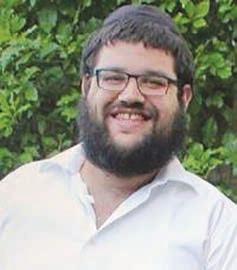
What possible connection is there then between the title of “Tazria,” or childbirth, and the contents of this portion, which deal mainly with the leprous-like affliction of tzora’as — unknown nowadays — that resulted from evil gossip, lashon harah?
Not only does the title “Tazria” seem to have no connection with tzora’as, they are seemingly opposing ideas.
Tazria refers to birth and new life, as the verse states: “When a woman conceives and gives birth…,” while tzora’as indicates the very opposite. As our Sages state: “One afflicted with tzora’as is considered as if dead.”
The concept of reward and punishment
MANN
CONTINUED FROM PAGE 10
especially those who needed to say Kaddish and observe yahrzeits. In general, outdoor minyans would be highly problematic due to the bone-chilling Jerusalem winters. But as luck or Divine Providence would have it, this turned out to be one of the mildest Jerusalem winters in memory.
The concern for the religious fulfillment of all Jews, even non-religious ones, was also present on Rosh Hashanah. The primary mitzvah of that day is to hear the blowing of the shofar.
But what about people who could not make it to a shul? An appeal was made for all people who could do so to go to their windows and blow the shofar at 11 a.m. At that moment, people walking through the streets paused and fulfilled the mitzvah. Even many not wearing kippot stopped and listened respectfully, and the nation was united in this special divine service.
Israel demonstrated its energy and vitality in its manner of distributing the miraculous COVID vaccine, which was created in record time. It is especially important that it be distributed in an efficient and widespread manner. Here there was no need for anyone to apply for the shots.
Back in December, my wife and I were notified by text as to the time and place of our inoculations. We were then called to confirm the appointments. We went at the set time expecting to have a long wait. To my pleasant surprise there was no delay. We were admitted and given the shot immediately.
TSince the Torah is replete with verses that indicate that G-d is compassionate and merciful, it follows that His punishments are not for the sake of revenge — Heaven forbid — but are for the sinner’s benefit, to help them with improving their conduct.
However, it is not patently obvious that most of the Torah’s punishments benefit the individual during his lifetime. This was not the case regarding tzora’as ; it was clearly revealed that this benefited the person.
The Rambam writes: “This alteration [of tzora’as ] that affects clothing and dwellings…. was not a natural phenomenon. Rather, it was a sign and a wonder that affected the Jewish people to keep them from speaking lashon harah. For he who speaks lashon harah will have the beams of his house altered [by tzora’as].
“If he repents, then the house becomes undefiled… If he does not… ultimately
G-d reordered nature to keep individuals from engaging in lashon harah Tzora’as would first afflict a person’s home, then his clothing, and finally his person, to tell the sinner, gently at first, and then more severely, to stop indulging in lashon harah
Even the punishment of the person himself, which required that he “sit alone, outside the camp shall be his dwelling,” was for the purpose of seeing to it that he “cease occupying himself in evil speech, scoffing and lashon harah.”
The reason why this portion is titled “Tazria” will be understood accordingly: Tazria is the beginning of life. The tzora’as itself, as well as the person’s dwelling alone, are not so much meant as a punishment, but as a means of rectification and healing, enabling one to begin a new lifestyle free of lashon harah
All aspects of Torah serve as a lesson. Tzora’as was clearly for the benefit of
MELMED
CONTINUED FROM PAGE 10
On a personal note, I was able to navigate most of the challenges of the COVID year in stride. We must appreciate and be fully grateful for the benefits that are provided by advanced technology. For me, it is a game changer. True togetherness consists of meaningful and intense communication.
I have many students across America and Israel and hold classes with them via Skype and Zoom. While this venue may be problematic for young children, it is ideal for adults. And due to the fact that so many people have been homebound, more of them are signing up for virtual Torah classes. If a rediscovery of the supreme Jewish value of learning emerges from this gloomy season it will be a positive development.
The matzav (situation) seems to be improving every day here in Israel as the nation hopefully approaches herd immunity. The political indecisiveness still persists and we had the privilege to participate in the fourth Israeli election to be held in two years. Let’s hope a spirit of national unity emerges which allows for the establishment of a strong and stable new government.
As we gingerly make our way out of the restrictions imposed by COVID, let us hope we emerge with a greater understanding of what truly matters and the wisdom and compassion to make this great country and the world a better place. JN
These skills are not innate and often need to be taught explicitly. Rewarding positive, pro-social behaviors rather than punishing undesirable behaviors is a tried-and-true behavioral strategy. Try to clearly identify a specific behavior needing change and determine what needed positive social skill it needs to be replaced with. Then reinforce and shape those positive skills with rewards and praise. In that way, you can help your child replace negative behaviors with positive ones.
My “ST4 (Stop! Take Time To Think!) Mindfulness” series teaches children tools to address common challenges. By providing tools for taking charge, children can be actively engaged in the treatment process. It assures them that you are on their side and that you understand the challenges they are having. You thereby become an authoritative parent rather than an authoritarian.
Children’s abilities to recognize their own power to turn things around is key. Rather than being told what not to do, children can proactively participate in their own selfmanagement in a fun, interesting, and, most importantly, useful way.
ST4 is designed to help a child enter the present moment by becoming cognizant of what is going on around them, what others are doing or saying and what they themselves are thinking, feeling and doing. In short, it allows them to become mindful.
Another tool is the “Monstercam,” which is designed to help children filter outside distractions and instead focus
the individual. The same is true of all punishments in the Torah; they are all for the rectification of the sinner so that he will return to the proper path in life.
And why is this lesson specifically gleaned from tzora’as ? Because the suffering of tzora’as — being considered as if dead and compelled to exist in absolute solitude — is one of the most severe in the Torah.
If in this instance we can clearly see the benefit — being reborn anew — then surely this is so with other punishments: They are all part of a sinner’s spiritual rehabilitation, thus helping make a new beginning possible. JN
attention on what is salient.
This is simple to institute right now. Explain how we view the world through lenses in our eyes — just like in a camera. Have your child pretend to use their eyes like a video camera by shaping a rectangle with two fingers from each hand. Now “film” the video screen, the room or just the people around them. Show them how they can zoom in and out — similar to the zoom feature on a video camera.
This is called “reading the room.” Your child can now “see” what other kids are doing and what the teacher is doing. They can now figure out how to fit in more comfortably. They can “film” themselves entering a conversation and deciding how to act and what to say. By knowing what they should be doing, they might make and keep more friends.
If we remain resourceful, understanding, knowledgeable and authoritative, our children will do just fine. Guiding children gently along their own path to the self-realization that they are beautiful and gifted, regardless of faults or foibles, should be the goal of every mindful parent. Let your child know that they are accepted unconditionally while at the same time teaching them the tools necessary to navigate the challenges of life. This is not easily or quickly achieved — but it is what we all strive for. JN
JEWISHAZ.COM JEWISH NEWS APRIL 16, 2021 11 RELIGIOUS LIFE TORAH STUDY
Rabbi Shimi Ash is the spiritual leader for Chabad Jewish Center of Gilbert.
SHABBAT CANDLE LIGHTING APR. 16 - 6:42 P.M. APR. 23 - 6:47 P.M. SHABBAT ENDS
Find area congregations at jewishaz.com, where you can also find our 2021 Community Directory.
APR.
Rabbi Reuven Mann is the founder of Congregation Torat Emet in Phoenix.
PARSHAH TAZRIA LEVITICUS 12:1-13:59 RABBI SHIMI ASH
Raun D. Melmed is the director of Melmed Center, co-founder and medical director of Southwest Autism Research and Resource Center and author of “ST4 Mindfulness” book series for kids.
Temple Beth Shalom of the West Valley and maintaining b'nai mitzvah during the pandemic


 MARVIN BERRIS
MARVIN BERRIS
Temple Beth Shalom is the only Reform congregation in the West Valley, and we have a multi-generational and egalitarian membership. We are proud of our history of inclusivity and that we are able to offer a full range of educational programming, community and social functions and religious services to our members and all Jews located in the West Valley. And we have worked hard this past year to continue as much programming as possible. B'nai mitzvah are one example.
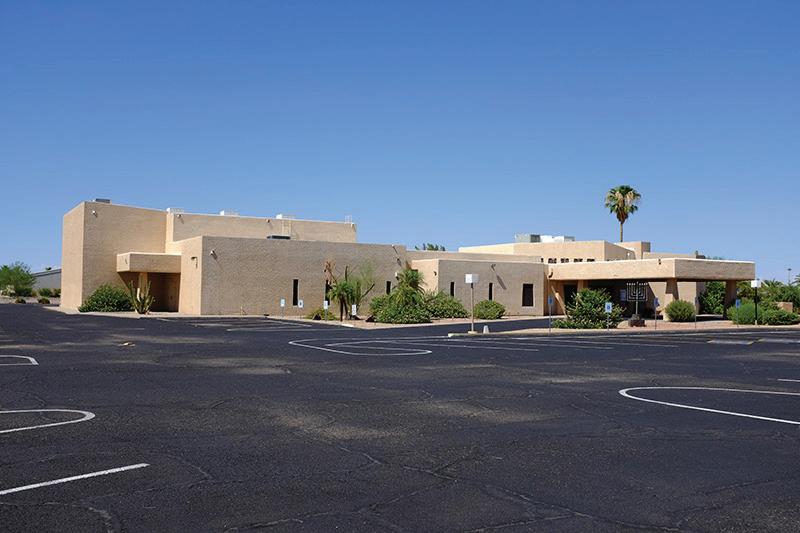
Despite the effect of the pandemic, we continued with our commitment to provide timely bar and bat mitzvah ceremonies. During this last year of adversity, we successfully had three adult and five teen b’nai mitzvah.
The stories that we can look to for guidance on how an institution such as ours is able to fulfill our responsibility to our students in the bar/bat mitzvah program are in fact thrilling. These candidates were able to become b’nai mitzvah from steadfastness to educational principals, ingenuity and innovation.
We were able to perform a bat mitzvah for a woman turning 100 years old just two weeks after our temple had to shut down due to the virus in March 2020. We realized that at that age, time is of the essence and not just a cliché.
She spent years preparing, learning her Torah reading, portions of the religious service for Friday night, and writing a marvelous speech. She had planned how to welcome her guests only to learn that the sanctuary would be closed to them.
She had invited about 85 relatives and friends from all over the world to attend.



When it became clear that she would not be able to celebrate in our sanctuary with her expected family and friends, it was decided to postpone the event.
Time passed, something that a woman of 100 has learned to experience, but she also knew that the vagaries of life might eventually prevent her from demonstrating her knowledge and ability, so with the advent of Zooming services at our temple, her special day was rescheduled.
Present with her in the sanctuary was just one of her sons and daughters-in-law, the rabbi, our educator and our cantor. The ceremony was held while the rest of her entourage watched attentively on Zoom cheering her on from their living rooms around the world with chat messages.
her parts brilliantly. Though this was not the ceremony that she had envisioned, nevertheless it was watched by over 100 people and was an extremely moving experience.
We watched and listened as she gave a history lesson we will not soon forget. She spoke about how long she has yearned to have her bat mitzvah; her lifelong attachment to Judaism, first in the Chicago area and later in Arizona; and what the Jewish wisdom that she acquired through her educational and life experiences had contributed to her appreciation of life.
We’ve pretty much continued to perform b’nai mitzvah for teenagers according to their previously determined schedule. The educator and director of our religious school, Andre Ivory, has been able through great effort, diligence and the cooperation of the students at the school and their parents, to do wonders at maintaining as normal a learning environment as could be expected during the pandemic.
Students and families were given the option of attending in person or learning online. Our religious school has met in person most Sundays with occasional online study depending on the particular circumstances of the week as we monitored the virus status and the positivity rate — a new word in our vocabulary.
Through studying recommendations of the CDC and Arizona health guidelines, we determined the limits of attendance in the sanctuary for services. Again, most people who would have attended in person had to attend using Zoom. This was a new experience for us and our membership. We had to learn as we went along, overcoming technical issues that interfered at times with
both those in the sanctuary as well as those watching and, hopefully, participating through Zoom. We believe that we succeeded, and in so doing, provided a highlight to each child’s religious destiny when he/she completed their service and became a bar/bat mitzvah.

B’nai mitzvah in the time of COVID will long be remembered by everyone who this experience has touched. This past New Year’s we had a double bat mitzvah. Two girls who met in our religious school became best friends. Their families joined together to have their bat mitzvahs as a unit, not only as a result of their friendship but the friendships of other siblings in the two families as well. It was quite an experience to watch as our temple family, “framily” as we colloquially refer to ourselves, watched and cheered for their combined demonstration of excellence in their preparation for and delivery of their bat mitzvah services.
While we have all experienced the loneliness and isolation that COVID brought us over the last year, we also have learned to live with COVID, and for that we will come out better for it on the other side. Rabbi Dana Evan Kaplan has taught us to look beyond COVID and instead to look forward to celebrating life events, including b’nai mitzvah, in a manner consistent with what God has provided for us at this time and as God’s gift.
As Jews we have learned to accept God’s will. We look forward to continuing our celebrations as we can, and adjust when necessary, for this is life and life is what God has provided for us. JN
12 APRIL 16, 2021 JEWISH NEWS JEWISHAZ.COM SPECIAL SECTION
BAR / BAT MITZVAH PLANNER
Marvin Berris is the president of Temple Beth Shalom of the West Valley.
SHARE YOUR GOOD NEWS where all your friends can see! Bar/Bat Mitzvahs, Births, Engagements, Weddings Milestone announcements are an added bene t for subscribers. For subscription details, contact subscriptions@jewishaz.com.
PHOTO COURTESY OF TEMPLE BETH SHALOM OF THE WEST VALLEY
Lessons learned: Planning a pandemic bar/bat mitzvah

 ISABELLA LEFKOWITZ-RAO | CONTRIBUTING WRITER
ISABELLA LEFKOWITZ-RAO | CONTRIBUTING WRITER
When the world shut down last March as fear spread that the coronavirus was as lethal as it was unknown, Ben Pollack of Washington, D.C. was days away from his bar mitzvah. Everything was set: synagogue services on March 28 and a big dance party the following evening. A typical bar mitzvah.
“We were called on March 13 and told that the synagogue would be closed through March 29,” said Becky Reed, Ben’s mother. Ben’s bar mitzvah was off.
Of course the synagogue was closed much longer. What followed were seven months of confusion and replanning. That synagogue service and dance party were rescheduled for Oct. 24. But as October grew nearer, it became clear that a typical bar mitzvah was still out of the question.
So the family opted for a havdalah service via Zoom. Having it after Shabbat let family members who are Sabbath observant attend virtually.
“We shifted how we imagined the bar mitzvah, because by October the devastation was very clear and a party really couldn’t happen,” Reed explained. “We just wanted whatever we did to match the spirit and the tone of what was happening in the community.
“It does really focus you on all the things that matter,” she said of trying to create a simchah, a joyous event, amid a pandemic. “What matters is this incredible transition that kids have at 13 from childhood to a march toward adulthood. It’s quite striking and beautiful.”
Other families agreed. Even though a bar or bat mitzvah is difficult to pull off right now, it’s definitely doable, they said. And no matter what, it’s going to be just as meaningful as it was before.
If you’re contemplating planning a bar or bat mitzvah, or have a date set, it’s important to figure out your top priorities early and then find a way to make them happen. Focus in on the things that are the most important. And no matter which route you take, it’ll still end up meaningful. And likely unforgettable.
Alexis Cohen began planning for her son Isaac Gantsoudes’ June 12 bar mitzvah three years ago.
“I was actually done planning when COVID hit,” she said.
A year later, it looks like Isaac’s service will be able to take place in the sanctuary of his Virginia synagogue and the family is hoping to host something resembling a pre-pandemic dance party outdoors.
“We have three options,” Cohen explained. “We’re either going to have tents outside at the hotel in the parking lot, and then there’s two options at home. One is catered and one is food trucks.”



She said there are 150 people on the in-person guest list. Still, the number of people who will be able to attend depends on orders from the governor’s office.
“We don’t even know if people want to come or if they will come,” she said. “I don’t have any answers for June and I don’t really know what my next steps are, so I’m just trying to prepare for every scenario.”
Cohen’s goals are to be flexible, maintain a sense of perspective and understand that Isaac’s bar mitzvah will happen on June 12 no matter what.
“People are trying to put a 2019 party into a 2021 environment,” Cohen said. “I just want to celebrate my son. The people who are trying to wait this thing out are going to be really surprised with how long they have to wait.”
Lauren Schrier’s bat mitzvah was on Feb. 6.
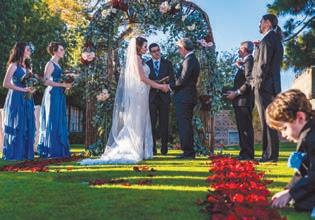
It took the family time to come to terms with a small havdalah service and car parade instead of a country club blowout party in Maryland. “You know what? It was awesome!” said Lisa Schrier, Lauren’s mom. “We just kind of embraced it and said we’re just going to have to deal with it and we made the best of it. It wasn’t about the party. It was more about the meaning of why we’re really doing this.”
The 18 guests at the service each had a COVID-19 PCR test and were quarantined before the ceremony. The parade, with 100 cars full of Lauren’s friends and family, lasted an hour and a half. And because nobody wanted her party dress and high tops to go to waste, Lauren, a soccer player, also had a photo shoot with her dress on a soccer field.
Canceling the original party meant wrangling with the vendors. Schrier said that some were willing to give back the deposits. Others disregarded their contracts and refused to return deposits, even if they didn’t provide services.
Other elements of the bat mitzvah maintained a sense of normalcy. The Schriers sent paper invitations to their guests, and the 90 kids who RSVP’d received logoed sweatshirts and kippot. Being able to do regular bat mitzvah things meant a lot to Lauren, her mom said.
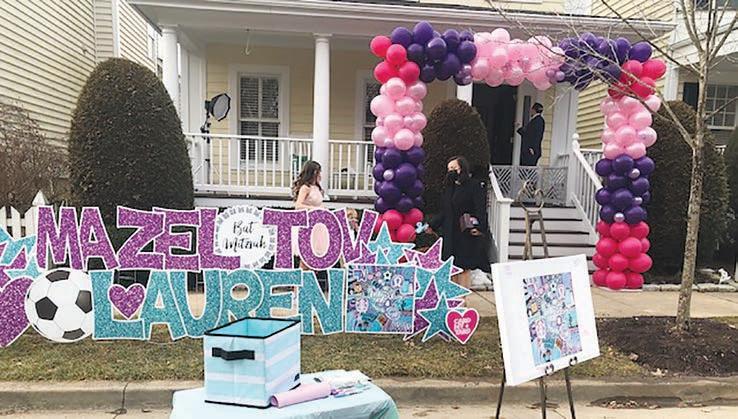
“You have to get out of your mind what it’s supposed to be and pivot and make it happen,” she said. “Embrace the
service and the meaning of what becoming a bat mitzvah means, and that change to adulthood.”
William Zimmet’s bar mitzvah was delayed for almost a year by the pandemic. Originally scheduled for last April, William’s ceremony took place in Maryland on March 27.
His synagogue doesn’t allow Zoom services on Shabbat, said William’s mother, Gilda Zimmet. But it was important to the family to have the service in person and for William to read from the Torah.
Only 30 people could attend the service, which was followed that night by the first Passover seder.
“We couldn't really even have a party because our house was cleaned out of all nonPassover foods and people were in a hurry to go home and get ready for their seder,” Zimmet said.

Instead of a party, William had a couple close friends over on the Thursday before.
“It’s important to think about what your priorities are and your tolerance for technology,” Zimmet advised, echoing some of the other parents. “Whatever plans you make should be plans that can change on a dime.”
Before the pandemic hit, the Zimmets had already booked vendors and caterers, and ordered kippot (with a date on them that the coronavirus made obsolete). “No matter what,” Zimmet warns about customized swag, “I would suggest not putting the date on.” The Zimmets are putting what they’ve learned to work as they look forward to William’s sister’s bat mitzvah, scheduled for November 2022.
“Just use the experience as a learning tool in terms of your teenager understanding that sometimes we think we control everything. Here’s the perfect example of something that’s completely out of your control and you just have to be flexible and do the best you can.” JN
JEWISHAZ.COM JEWISH NEWS APRIL 16, 2021 13 SPECIAL SECTION
BAR / BAT MITZVAH PLANNER
Isabella Lefkowitz-Rao is a contributor to Washington Jewish Week, a Jewish News-affiliated publication.
AZRetroRentals.com 602-705-3571 azretrorentals@hotmail.com ARIZONA’S MOST UNIQUE RENTAL INVENTORY WeddingS Bar/Bat MitzvahS Special Events
Lisa Schrier still found novel ways to celebrate her bat mitzvah during COVID.
Local rabbis reflect on memorable b’nai mitzvah during pandemic
NICOLE RAZ | STAFF WRITER
B’nai mitzvah ceremonies have transformed during the COVID-19 pandemic from crowded affairs to limited gatherings of friends and family. Over the past year people have become used to watching a Haftorah reading via Zoom instead of inside a sanctuary.
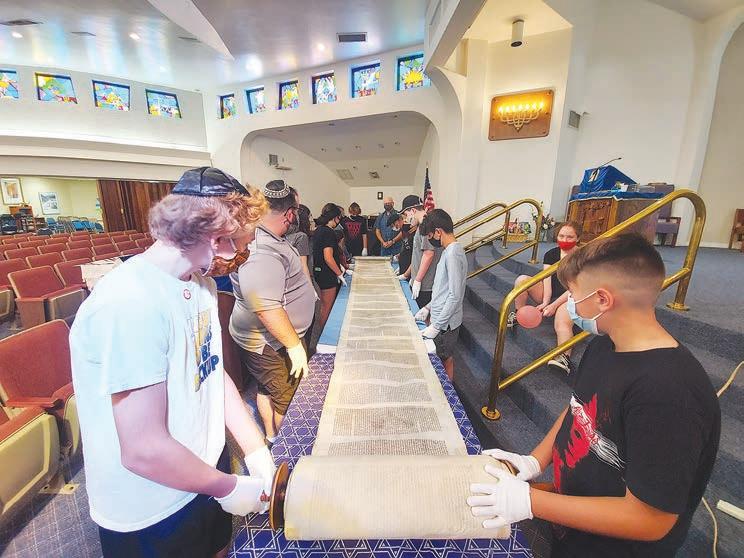
At first glance, that may seem like a big downgrade, but Greater Phoenix’s rabbis don’t view it that way. A few of them shared some of the past year’s ceremonies that will stick in their memories forever.
Downtown Phoenix Chabad Rabbi Dover Dechter will always remember a bar mitzvah that he witnessed right at the beginning of COVID.
It was scheduled to be in Israel on March 16, 2020. “There had been illness in the family, and this was bound to be a very special event,” Dechter said.
But as the day approached, the guest list shrunk as friends, family and relatives didn’t feel comfortable traveling amid the uncertainty, fear and danger brought about by the emerging pandemic.
“Finally, it was down to the wire and only the parents and bar mitzvah boy were going to go,” he said. Then, Israel sealed its borders to all foreign travel and the destination bar mitzvah was totally scrapped.
The family decided to forego the trip and have the ceremony anyway.
“It was a far cry from what they had envisioned,” Dechter said. “A grandma, two parents and the bar mitzvah were all who were able to make it.” But it was still very powerful.
“The bar mitzvah had been stripped of all the fanfare, but the core was still here,” Dechter said. “There were no distractions from the main part of what is a bar mitzvah. The effort everyone had to put in to get to that moment, really made it all the more special. I have attended many bar mitzvahs over the years. But this is one that will always stick out in my mind and will inspire me always.”
One unexpected ceremony last year stood out as especially moving for Temple Beth Shalom of the West Valley’s Rabbi Dana Evan Kaplan. Rae Bolnick, 100, was supposed to have her bat mitzvah just two weeks after the shutdown in March 2020. After much debate, she and her family decided to postpone. But with the help of Zoom, she ended up having her ceremony a few months later.
“The ceremony was held in our sanctuary with participation from many of her relatives on Zoom,” Kaplan said. “We all wore masks and socially distanced even though there were only six or seven of us in the entire sanctuary. Obviously this was not the ceremony that she had envisioned but it was nevertheless extremely moving.”
Kaplan was taken with the way Bolnick spoke about how Jewish wisdom had contributed to her appreciation of life.
At Congregation Kehillah, both Rabbi Bonnie Sharfman and Renee Joffe, the synagogue’s administrator, said that families learned a great deal from experiencing bar and bat mitzvahs during the pandemic.
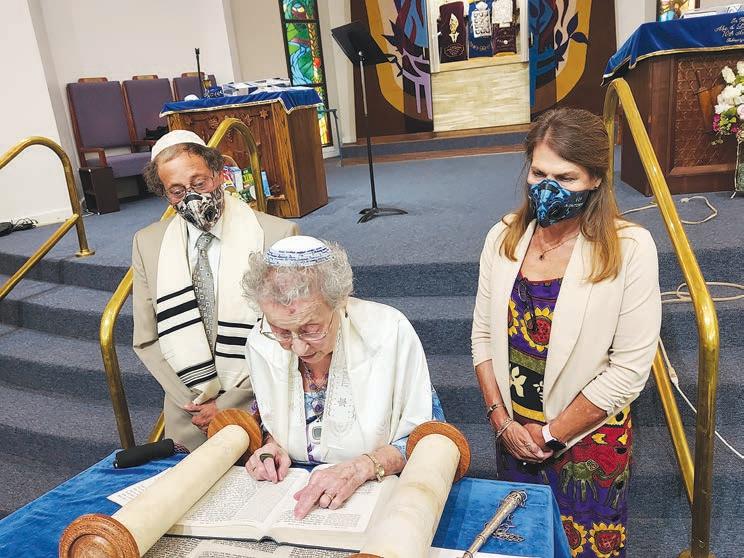
“While there was a sense of shared disappointment on the part of some parents with plans being
canceled, they also shared that it felt like a more intimate, personal experience with less distraction, and parents valued what Kehillah did to make it so,” Sharfman said, via email.
Kehillah’s first Zoom bar mitzvah was in March 2020, early on in the pandemic.
“Up until a few days before, we were still vacillating over whether or not to hold the ceremony in the sanctuary in person,” Sharfman said. “There was no precedent to follow from within or outside of our congregation about what a Zoom bar mitzvah would look like.” But the family set up a “sanctuarylike, sacred space in their home and we together processed so many details.”
The ceremony was virtual so many people from around the country participated who otherwise would not have been able to make the trip to Arizona.
“What made it special was our very determined bar mitzvah student who was extremely well-prepared, a very flexible and engaged family who put their trust in us and a commitment to living what a bar mitzvah actually represents,” Sharfman said.
One stand-out ceremony at Temple Emanuel of Tempe, happened only a couple of months ago, said Chelsey Falk, the b’nai mitzvah coordinator. Aidan Calabretti’s bar mitzvah on a Saturday morning in February came on the heels of his mother’s bat mitzvah the evening before.
“Both were in person, outside, at the temple and it was so amazing to see them celebrate together with a small group of family members,” Falk said. “All of our ceremonies have been so special, mostly because the ceremony has been the main focus. And it’s been so meaningful for family and friends to come together for the first time in a while — whether it be with a small group in person or via zoom.”
Rabbi Julie Kozlow started at Prescott’s Temple B’rith Shalom only four months before the pandemic set in, and three of her students were ready to start preparing when she arrived.
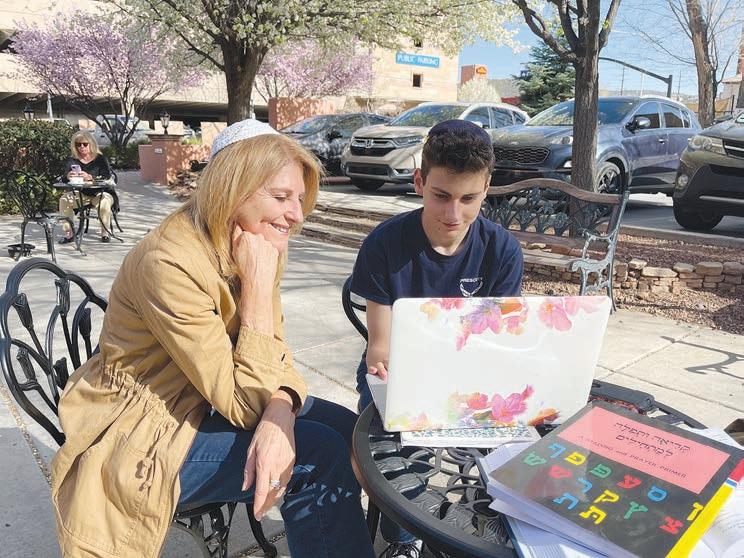
“I was working with them on a weekly basis, and then COVID hit,” Kozlow said.
All three students decided to postpone their ceremonies, and one bat mitzvah student had to learn an entirely different Torah portion. Once Kozlow started the religious school, two more students, Leo Charlap and Adam Grey, both 14, also wanted to begin preparing for a bar mitzvah.
All of her students are inspirational, Kozlow said, but she greatly admires the initiative of Charlap and Grey. At 14, they are both past the point of parental coercion.
“For these two young men, Leo and Adam, to step up and in the middle of COVID, at 14 years old, and say, ‘I want to be a part of the One Room Shul House at Temple B’rith Shalom, and I want a bar mitzvah,’ I think is inspiring beyond words,” Kozlow said. “It really just makes my head and my heart explode to see that with all the demands on them.”
This past year has been a lot to deal with for everybody, and especially kids, she said. “For them to still be inclined to a spiritual experience, to me, is amazing.” JN
14 APRIL 16, 2021 JEWISH NEWS JEWISHAZ.COM SPECIAL SECTION
BAR / BAT MITZVAH PLANNER
Rae Bolnick, 100, performs her bat mitzvah in 2020. PHOTO COURTESY OF RAE BOLNICK
DANA EVAN KAPLAN
Bar and bat mitzvah students unroll a Torah at Temple Beth Shalom of the West Valley. PHOTO COURTESY
OF
Prescott Temple B’rith Shalom Rabbi Julie Kozlow prepares Adam Grey, 14, for his bar mitzvah.
PHOTO COURTESY OF JULIE KOZLOW
always stunning
The Camby Ballroom, a beautifully appointed space adorned with crystal chandeliers, can accommodate up to 450 guests - perfect for bat mitzvahs, holiday parties, weddings and special events. Your guests will feel like royalty from the moment they step through the doors.
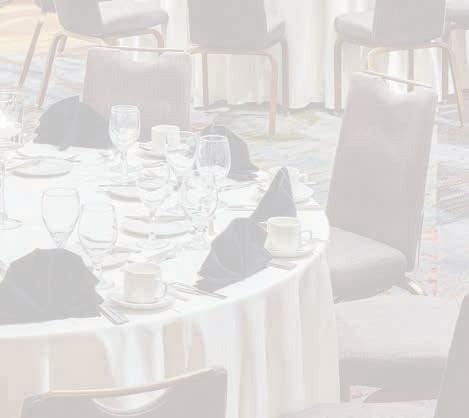
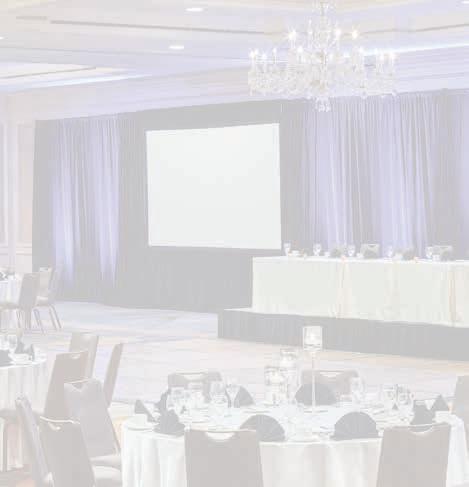

The Camby Hotel offers unique indoor and outdoor venues, equipped with the latest technology and exceptional professional services.
FOR MORE INFORMATION, CONTACT US AT EVENT S @THECAMB Y.COM 2401
JEWISHAZ.COM JEWISH NEWS APRIL 16, 2021 15
E. Camelback Road, Phoenix, AZ 85016
Shemesh Camp at The J to open in June, SARRC to partner
SHANNON LEVITT | MANAGING EDITOR
Benjamin Doherty liked the small, intimate pod system that Shemesh Camp at Martin Pear Jewish Community Center created last summer as a measure of protection against COVID-19. As a kid who can get easily overwhelmed by the chaos of large groups, the camp’s shift away from bigger cohorts worked well for him.
“Ben’s been diagnosed and is on the light side of the (autism) spectrum,” said Nomi Doherty, Benjamin’s mom. He is entering his fifth summer at Shemesh on June 1, and Doherty gives the camp a lot of credit for its efforts to make every camper feel at home.


When she learned that Southwest Autism Research & Resource Center would be partnering with Shemesh this summer, she was pleased but not surprised. Inclusion has always been part of the Shemesh experience, she said.

“There’s certain things you see in your own kid — like needing things repeated, needing intervention in social situations,” she said. “Shemesh has always been a godsend for that. They treat every child as an individual and meet them where they are, and Ben is definitely right there.”
Kim Subrin, chief officer of camping and family services of MPJCC, thinks that SARRC’s partnership will help highlight the
camp’s inclusion efforts. And she pointed to the camp’s long-standing relationship with Gesher Disability Resources as well.
Prior to the start of camp, SARRC will work one-on-one with Morgan Froke, Shemesh’s full-time behavior inclusion specialist. The camp’s leadership team and then all staff will be trained on behavioral and full inclusion programming for summer camps.

“Every camp’s different but it’s best received when it comes from the leadership,” said Megan Mann, SARRC’s senior clinical consultant.
Once camp begins, a SARRC representative will visit Shemesh weekly to observe campers and camp staff at work. They will provide oncall support as needed in order to ensure that all campers at a disadvantage have what they need to participate in camp fully.
“I’ve never worked with a camp that’s not been receptive to more support on how to be inclusive,” said Mann. “That’s the feeling I get from Shemesh. Just by being open and collaborating — it’s a great help.”
Doherty agreed that Shemesh’s inclusive spirit is important. But what most distinguishes the camp, she said, is that the staff takes its responsibility to campers seriously.
“Shemesh is a place for kids, and nobody does it better,” she said. “They want to make the experience special for the kids,
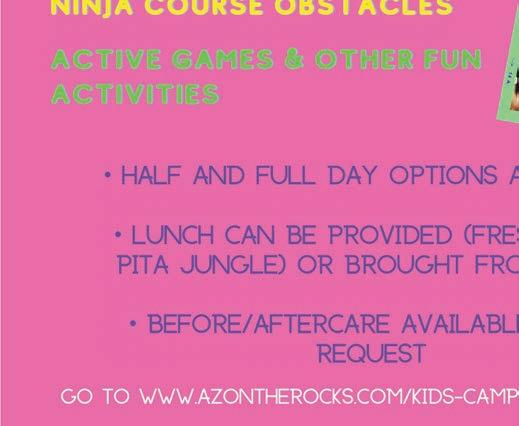
not just occupy their time.”
Part of that is a focus on good programming. After garnering a year of experience dealing with COVID safety measures, Subrin said this summer will be about getting back to camp essentials. And she feels more confident about safety this summer since every specialist on staff is a teacher with experience running programs during COVID.
While still prioritizing safety precautions, Subrin said, “it’s exciting to focus on what we get to include back into camp for these campers.”
The calls and questions she receives about COVID have dried up recently, and now people just call to ask general camp questions. “People are just feeling more comfortable now,” she said.
Doherty is confident that Shemesh can “mitigate as many risks as humanly possible” while still letting the kids have fun. After all, she joked, “kids are kids and they will sneeze into one another’s mouths sometimes. Nothing is risk free, and I know the JCC goes out of their way — at some point, you just have to be comfortable.”
Samantha Oliver agreed. Last summer she was nervous to send her 6-year-old son, Thomas, to camp with the threat of COVID looming, but she was reassured by Shemesh’s good communication with parents and its
safety precautions. This summer, she’s feeling more relaxed. “They did an amazing job last year, and they’re still following all the CDC guidelines,” she said.
She feels better just knowing Thomas can take new things in stride. Last summer was his first camp experience, and she worried that he would be scared by all the safety precautions, like masks. But on his first day, he hopped out of the car with his backback, let staff check his temperature and bounded into camp without a backwards glance.
“Parents worry about adjustments, but kids just adjust,” Oliver said. JN
16 APRIL 16, 2021 JEWISH NEWS JEWISHAZ.COM SPECIAL SECTION
CAMP & SCHOOL GUIDE
Thomas Oliver gets ready for Shemesh Camp at The J last summer with his backpack.
PHOTO BY SAMANTHA OLIVER
2 Week Sessions Starting June 1st


Welcoming Grades 1st - 6th.


9 AM - 3 PM (Early Care Available)

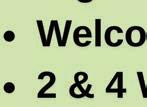


Sports, Arts & Crafts, Performing Arts, Games, Water Play & More!
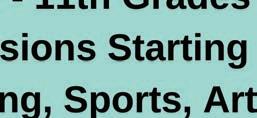
Special Day Each Week @ The Great Wolf Lodge!
camp56@cbiaz.org | 480-951-0323

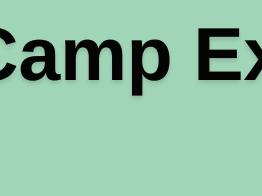

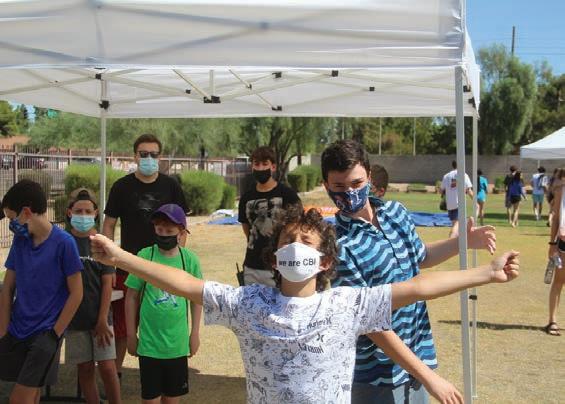
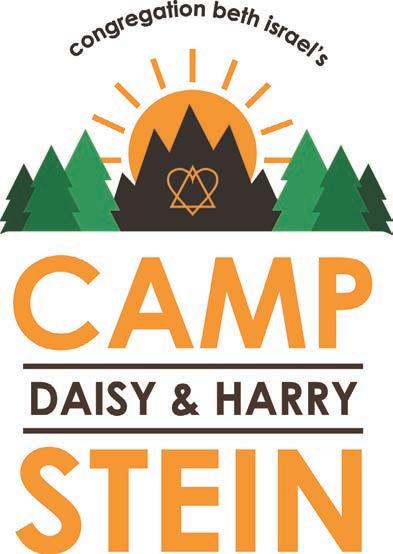
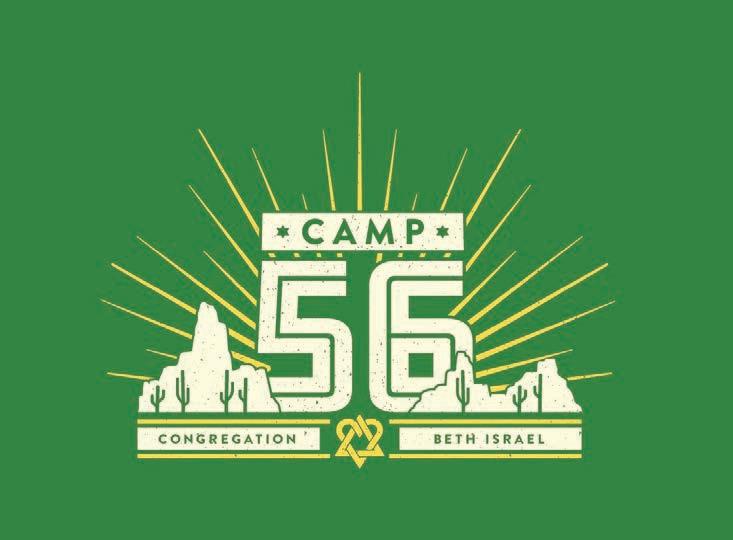
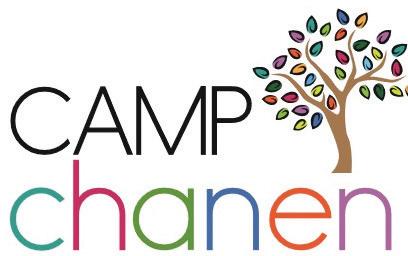
Weekly Sessions May 18th - July 30th


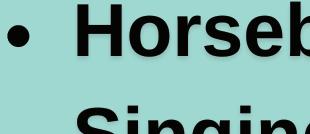

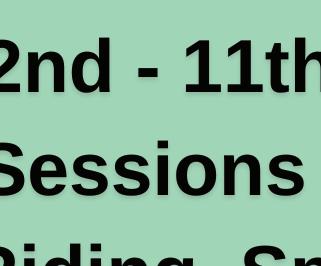
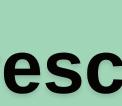

Enrolling Infants - Kindergarten





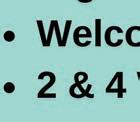


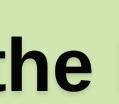
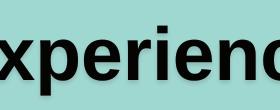







7:45 AM to 3:15 PM
Splash Pad, Art, Yoga, Educational



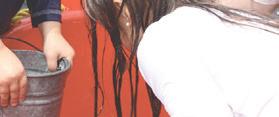
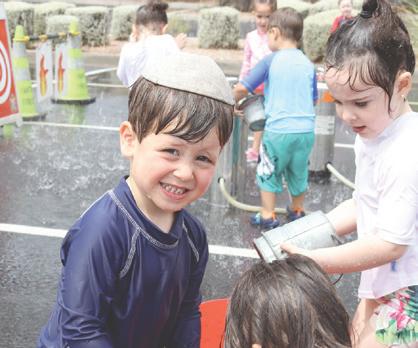



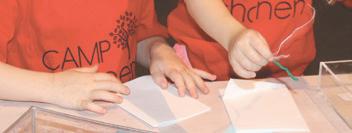
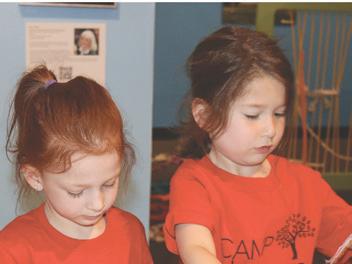
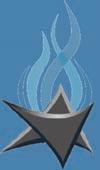
Activities, Music & Movement
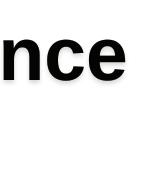
amy@cbiaz.org | 480-951-3398

Covid-19 Health and Safety Protocols Enforced
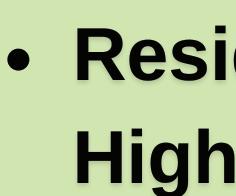
JEWISHAZ.COM JEWISH NEWS APRIL 16, 2021 17
Day Camp @ CBI Campus In Scottsdale
Day Camp @ Chanen Preschool
•
•
This past year, COVID-19 created a lot of challenges for people as they navigated a new normal, both personally and professionally. One of the biggest changes for people is deciding where to spend their time and how to utilize their living spaces.
People are going to the office less frequently — if at all — building home gyms, which has been helped by the surge of Peloton riding, and we have an increased urgency for safe areas to entertain family and pets in a sociallydistanced environment. These dilemmas have caused people to reassess their living situation and what these spaces now mean to them.
If you haven’t been following the residential real estate market, I will share with you that this is one of the hottest housing markets Arizona has ever seen,
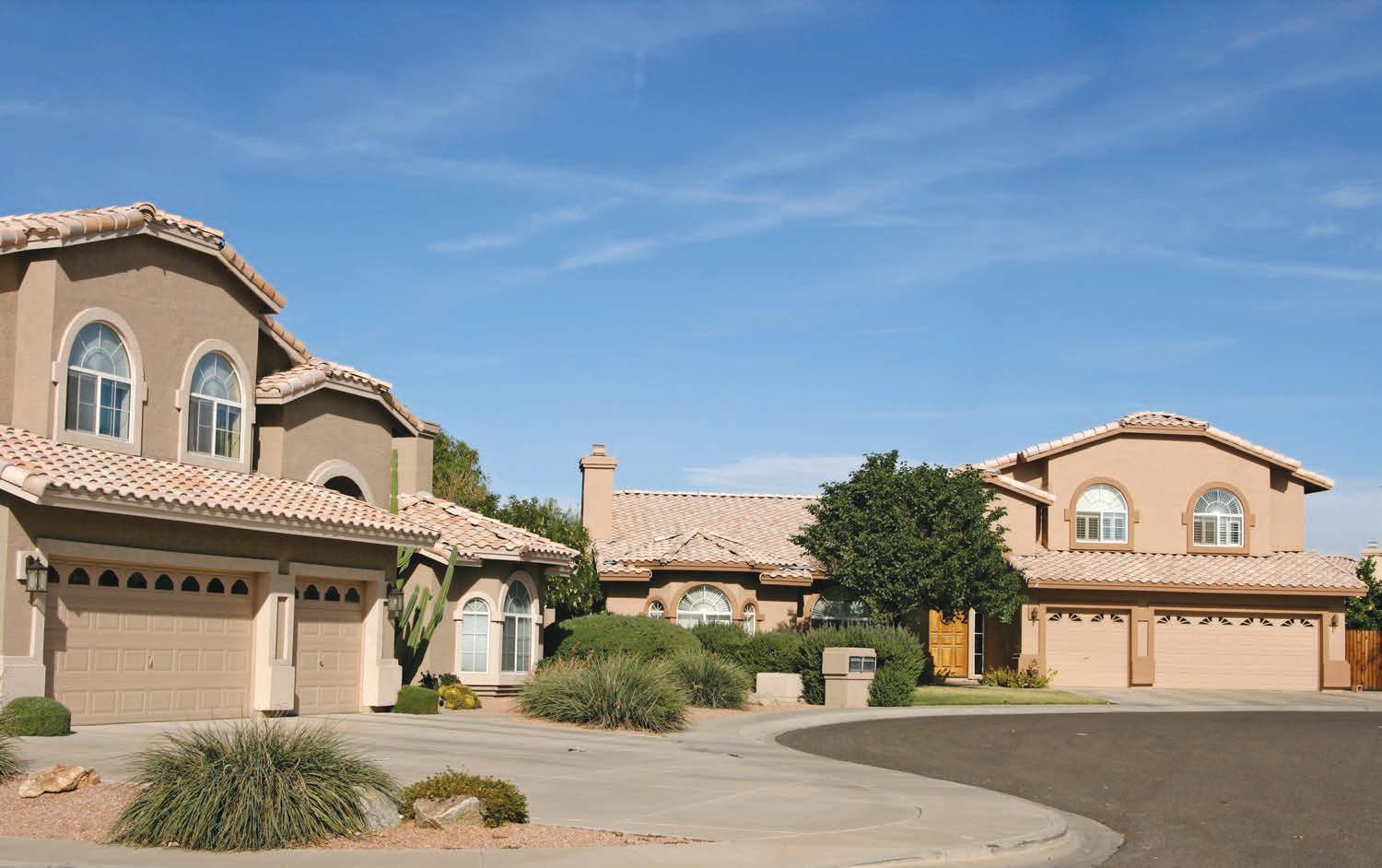
Home buyers’ list of wants changes in light of COVID-19 pandemic
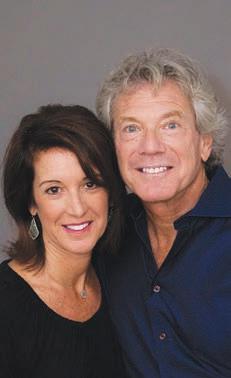

and there are a number of factors that have played a role.

One big factor is people’s need for that extra room that we call the “plus one.” Many people who were comfortable with the number of bedrooms and square footage a year ago now find themselves needing that extra plus-one space.
The plus-one concept has a few variations and can be used in several different ways. The need for this extra space is no longer just a want on a buyer’s wish list. It has now become one of the must-haves as people analyze their living conditions moving forward.
This new need has thrust buyers into the housing market out of necessity. No longer can the kitchen table suffice as a short-term solution to the home office. Bedrooms have become filled with workout equipment for more than
a year. Walking the dog down the hall of an apartment building just to get a little fresh air after a long day of not leaving the confines of the unit has become daunting.
These are the reasons why people are on the search for that plus one.
It can come in many shapes and sizes, but the most obvious plus one is the extra bedroom. A bedroom provides a fully private room with doors that can be closed off from the rest of the house for complete privacy.
An extra bedroom’s versatility is why it’s the number one preference for most buyers. Due to the privacy of a door, the uses of a bedroom are endless, whether you need an extra guest room, home office or gym.
The next most common plus ones are dens and lofts. These can offer the same space as a bedroom but may be missing doors for complete privacy. Though they may not have the same seclusion, they often accomplish the need for an additional room.
And the good news is they often don’t come with as high a price tag. Since a bedroom is more desirable and marketable it can be hard to find a home on the market within budget. With price in mind, many people are opting for the loft or den as a reasonable solution which will often solve the buyer’s needs.
A yard and outdoor space have been a huge driver for buyers as well — especially those buyers coming from condos and apartments. After months of quarantine, people had a desire to get fresh air. When summer arrived, people craved a
BRYCE SCHOTZ
refreshing dive in the pool or an area for an evening bonfire with friends.
And when apartments closed their “luxury” amenities during the last year, renters realized how desirable their own private yard would be, and that drove many into the home-buying market.
Over the past year, backyards have been a safe area to congregate with friends and family, and the desire for this type of plusone space continues to grow.
As societal norms change, so will the needed features of a home. One clear example of such an evolution in trends is the garage. Before the 1950s, most homes in Arizona did not have covered parking. As we started seeing the need for cars, single carports were added, and they later evolved into fully enclosed single car garages. Now almost all new home builds come with a standard two-car garage because having a multiple automobile household has become typical and an integral part of our society.
If we can take one major lesson away from this past year, it is that our needs versus our wants have changed. No longer are we looking at extra bedrooms solely as sleeping areas, but we are determining what else this space can provide us. That search for the new plus one will constantly transform, and as we can see with the garage example, as our needs change homes will continue to adjust with the times. JN
18 APRIL 16, 2021 JEWISH NEWS JEWISHAZ.COM Jodi Geiger – 602-321-4149 Mitchell Geiger – 480-236-5934 Email: jgeiger@hsmove.com Ov 30 ye s of p tn ship in l e & business www.thegeigers-azhomesales.com MATCHING YOUR LIVING SPACE TO YOUR LIFESTYLE
Bryce Schotz is a third generation Arizona real estate agent and operates West USA Realty’s You Call the Schotz team.
ISTOCK
/ GETTY IMAGES PLUS / PASTORSCOTT
The ‘music matters,’ says cantorial soloist Susan Colin, not the platform
SHANNON LEVITT | MANAGING EDITOR
Susan Colin isn’t afraid to try new things. In March, she left her position as cantorial soloist for Congregation NefeshSoul in Chandler to work solely as a visiting guest artist and artist in residence for various synagogues.
While Colin loved her years at NefeshSoul, this move is something she had been contemplating for some time. She described her departure “not as a leaving but as a going to something new.” And Zoom played a role in making this an opportune time to make the transition.
She has always found that being open to “experience and opportunities” serves her well, she said. So when COVID-19 temporarily ended in-person gatherings, she was quick to adapt to virtual platforms, musically and professionally.
After all, she said, it’s what Jews do. “Jews adapt, pivot and repeat to find ways to stay connected, keep each other going and remind ourselves we are part of a chain, and music helps us with that.”
As an early adopter of YouTube, Colin didn’t hesitate to perform online in light of the pandemic’s restrictions. To ease people’s anxiety, even a little, Colin created “music buffets” on her YouTube channel, SusanColinMusic. She described the buffets as 20 minutes of “light and easy songs,” which gave viewers “a nice little tour” of Jewish music. As the owner
of OySongs, a digital platform for Jewish music, she had a vast array of music to choose from.
But it was when Cantor Seth Ettinger of Congregation Beth Israel put together a virtual concert for Tu B’Av last summer and invited Colin to be one of 11 contributors that new opportunities opened up for her.
A congregation in Westchester, New York saw the performance and contacted Colin to perform a virtual concert for them. More invitations soon followed.
“A year ago, nobody would have dreamed of paying someone to do a Zoom concert, and now this is just a normal thing,” Colin said. “It’s become a weird but wonderful technological option that we have. It isn’t perfect, but it still serves a really important purpose.”
Zoom also brought opportunities closer to home. Before the pandemic, NefeshSoul didn’t offer services every Shabbat. But seeing the congregation’s need for connection, Rabbi Dr. Susan Schanerman and Colin began holding weekly services. Colin also created a concert especially for NefeshSoul last November.
“Susan connected to the congregation through her singing, her careful mixture of Hebrew and English, her original compositions and her skilled blending of traditional and contemporary melodies,” said Schanerman, via email.
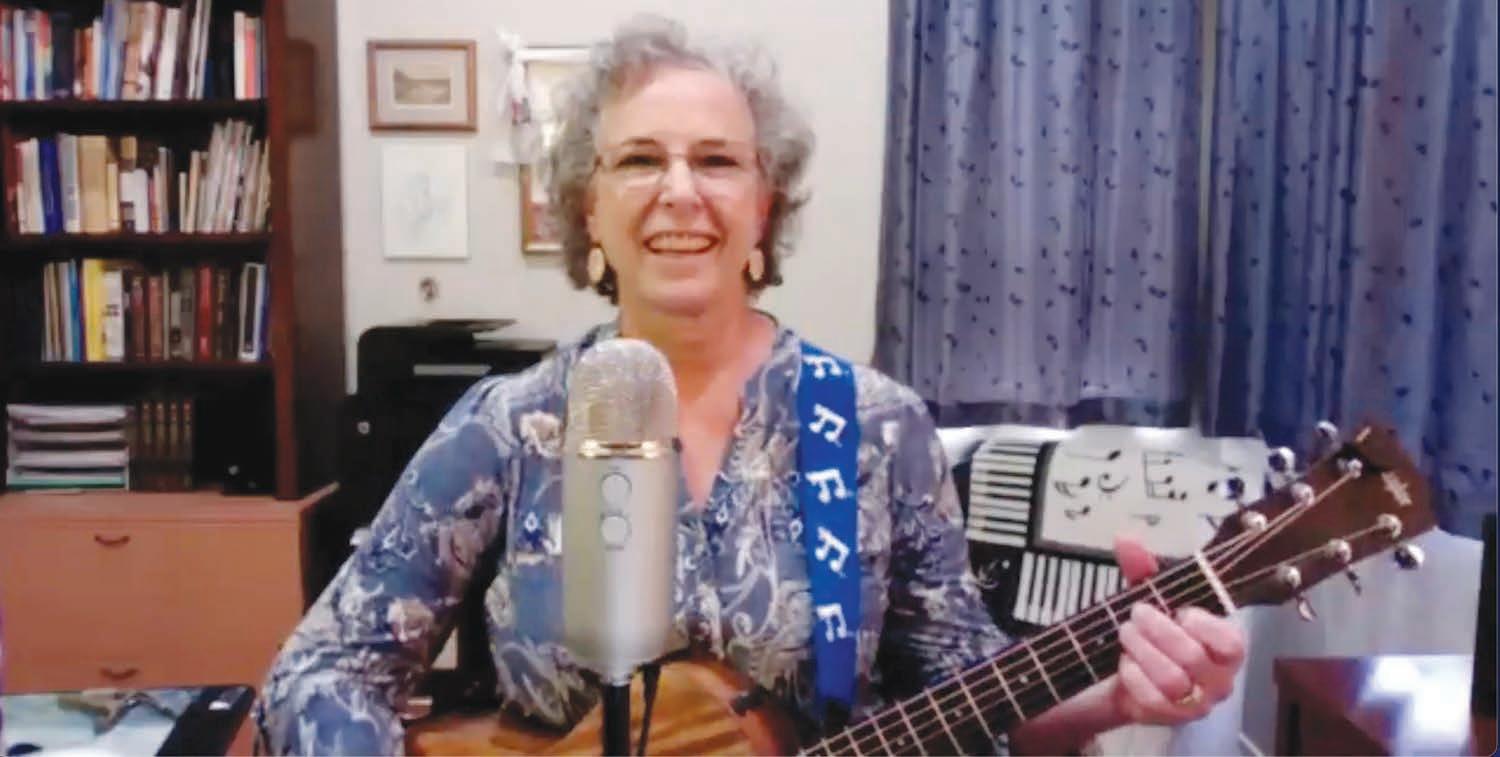
Colin plans her concerts around a theme that suits the moment. Then she sits with her initial plan for a day or two before revisiting it. She’s always thinking about how to connect with the viewers and wants to get the music that will be most familiar and enjoyable for any particular audience.
“Music matters,” she said. “Music does something that nothing else can do. It moves us and helps to express things that we may not have other ways to express. It can be cathartic, it can be uplifting.”
Since she isn’t able to use her go-to response songs on Zoom or harmonize with a virtual audience, she creates chemistry in other ways. She looks into the camera to create a feeling of eye contact. She chats with people at the beginning and end of a performance and uses gallery view at key moments, letting people see each other. She calls out for people to wave their hands or give a peace sign. And, of course, people are always free to dance while they watch. She does.
Zoom concerts can also feel more intimate, since audiences glimpse her at home. So she’s intentional about what she wants to share and why. In her office, she’s surrounded by her books and family photographs and viewers sometimes ask about them. That familiarity results in more chemistry, more connection.
And no two virtual concerts are
alike. Last month’s Zoom concert for a synagogue in Florida felt more like an episode of the “Merv Griffin Show,” she joked. But no matter the presentation, Colin emphasized the importance of taking the time to experience music rather than merely letting it fade into the background.
“Music affects us emotionally, spiritually, physically, and it’s one of the most important gifts we have to share together,” she said. “I’m relieved that we have the technology to share this in a more personal way.”
A colleague once told her that she had a nice voice, but if she wanted to build a legacy she would need to write her own music. She did, although it’s not her music that she considers her legacy, but rather how her songs affect listeners — in person or otherwise.
A few years ago on YouTube, a woman saw “Healing Song,” which Colin wrote about the “unique agony” of being a caregiver, and contacted her to express gratitude for capturing the essence of what many people in that position feel but don’t know how to express.
“I was touched that someone found my song for healing and related to it and took the time to write to me, and now that’s my legacy — that I provided comfort to someone,” she said. “Isn’t that the ultimate human connection? That’s what music can do.” JN
JEWISHAZ.COM JEWISH NEWS APRIL 16, 2021 19 LIFESTYLE & CULTURE
MUSIC
Susan Colin performs on Zoom.
PHOTO BY SUSAN COLIN
Featured Event
WEDNESDAY, APRIL 21
Comedy Night: 8 p.m. Join the founders of Nishmat Adin-Shalhevet Scottsdale, a new Jewish high school, for a virtual comedy night featuring Avi Liberman. It will also provide an opportunity to learn more about the school, which begins instruction in August. Cost: Free. For more information and to register, email info@nishmatadin.org.

Events
SUNDAY, APRIL 18
Jewish National Fund-USA Breakfast for Israel: 10:30 a.m. Stars of the Israeli Netflix hit series “Fauda” will join Jewish National Fund-USA and thousands of supporters across the country for the organization’s virtual Breakfast for Israel. Cost: Free. Register at jnf.org/bfi . Fore more information, contact Leila Mikal, Arizona’s senior campaign executive at lmikal@jnf.org or 480-447-8100 x987.
Stuff the Bus: 10 am - noon. Beth El Phoenix is accepting supply donations for the AZ Friends of the Homeless organization.
TUESDAY, APRIL 20
Courts Matter; You Be The Judge: 7-8:30 p.m. If you are an RBG fan, someone who enjoys legal TV dramas, or if you just want to learn more about the American justice system, this program by the Arizona chapter of the National Council of Jewish Women is for you. Participate in an interactive experience in which you will be a part of a federal court judicial bench discussing an abortion or voting rights case. The bench will deliberate over the case and reach a decision. Real cases are being presented and the actual decisions will be revealed. Cost: Free. Register at tinyurl.com/ m2zrj9v6. Fore more information, visit ncjwaz.org.
TUESDAY, APRIL 27
JBox Delivery. East Valley Jewish Community Center provides kosher meal delivery for East Valley residents in need. To sign up for a meal or to deliver meals, visit evjcc.org/jbox. The deadline to sign up is Tuesday, April 20.
FRIDAY, MAY 7
Mother’s Day Concert: 1 p.m. T.A. Burrows will be presenting a virtual Sing Street Café. He’ll include the great jazz standards and timeless works penned by legendary composers such as George Gershwin, Cole Porter and Duke Ellington. For more information and to register, contact seniorcenter@jfcsaz.org or call Jennifer Brauner at 602-343-0192.
Virtual Meetings, Lectures & Classes
FRIDAY, APRIL 16
Holocaust Survivors Speaker Series: 10 a.m. The Arizona Jewish Historical Society will host a virtual presentation by Oskar Knoblauch. Learn about his survival story and his inspiring autobiography, “A Boy’s Story, A Man’s Memory–Surviving the Holocaust 1933-1945.” Cost: Free. RSVP to afusco@azjhs.org.
Prosecuting Evil: The Arizona Jewish Historical Society is streaming the film “Prosecuting Evil: The Extraordinary World of Ben Ferencz” April 16-18. The streaming is sponsored by Desert Foothills Jewish Community Association and the documentary tells the story of Ben Ferencz, the last surviving Nuremberg prosecutor and lifelong advocate of “law not war.” Cost: Free. For more information and to register, visit azjhs.org/ prosecuting-evil.
SATURDAY, APRIL 17
Jewish Animal Advocacy: 7:45-9 p.m. The New Shul is hosting an online presentation by Shamayim, called “Havdalah For Health: Eating For Health and the Planet” after a short Havdalah ceremony. Lisa Apfelberg, Director of Shamayim and Aaron Guttman, owner Guttman Fitness, LLC, a Havdalah will lead the presentation. Cost: Free. Tune in here via Zoom using this link: us02web. zoom.us/j/8101222054. For more information, visit thenewshul.org or contact Marty Rosenstein behappybike@gmail.com.
SUNDAY, APRIL 18
Israeli Film Series: East Valley Jewish Community Center will host a daylong streaming of “The 90-Minute War,” a sharp-edged political mockumentary about the century of intractable conflict between Israel and Palestine being settled once and for all … on the soccer field. Cost: Free. Registration is required. Visit evjcc.org/film.
Jewish Philanthropy for Social Action: 3-4 p.m. The Jewish Community of Sedona and the Verde Valley will present a virtual educational program about Julius Rosenwald, whose philanthropy helped set the stage for the Civil Rights movement. For more information, visit jcsvv.org/ contact.
MONDAY, APRIL 19
Cultivating Trust: 1 p.m. Rabbi Dorothy Richman will lead a virtual Valley Beit Midrash class exploring the experience of trust by looking at the writings of Etty Hillesum, a Dutch woman in her late twenties living in Nazi-occupied Amsterdam. Etty’s journals and letters have been called “the most spiritually significant documents of our age.” Examine what gets in the way of trust and how to cultivate it, even in the direst of circumstances. Cost: $18. For more information and to register, visit valleybeitmidrash.org/event/cultivating-trustexploring-the-writings-of-etty-hillesum/.
TUESDAY, APRIL 20
Modern/Contemporary Judaism: 7 p.m. Since the French Revolution (1789) that granted Emancipation to the Jews of Western Europe, Jewish life was profoundly transformed. Emancipation, acculturation, assimilation, urbanization, industrialization, mass migration and secularization are the main forces that profoundly altered Jewish life in the modern period. This ASU Jewish Studies webinar will reflect on new historical and sociological scholarship on the place of Jews in modern and contemporary societies.
Cost: Free. For more information and to register, visit jewishstudies.asu.edu/jewishstudiestoday.
WEDNESDAY, APRIL 21
Celebrate Israel: 4-6 p.m. Join us outside the Ina Levine Jewish Community Campus to paint and celebrate Yom Haatzmaut together! Join artist, Orit Feinberg, as she guides us in a stepby-step painting class. You will be using acrylic paints to create your own painting of one of Israel’s beautiful landscapes. We will be painting outside with social distancing. Space is limited. No prior experience needed. All materials included. Cost: $40 for members, $50 for guests. For more information and to register, visit apm.
activecommunities.com/valleyofthesunjcc/ Activity_Search/1741.
THURSDAY, APRIL 22
Genealogy: 11 a.m. Judi Gyory Missel, a member of the Phoenix Jewish Genealogy Group and the International Association of Jewish Genealogical Societies, has been fascinated by genealogy for over 30 years. Join this four part once-a-month series to explore how to search your family roots from the comforts of your own home. Participants will receive a questionnaire to complete to be sent to Judi to assist in your family’s search. Cost: Free. For more information and to register, visit jfcsaz. org/cse or contact seniorcenter@jfcsaz.org.
MONDAY, APRIL 25
Raising Our Spirits with Jewish Artists: 2 p.m. The East Valley Jewish Community Center, Temple Beth Sholom of the East Valley and Temple Emanuel of Tempe partner to present a live virtual piano recital featuring Dr. Elias Axel Pettersson, founder of Southwest Piano Festival, who will perform works by Jewish composers and other monumental figures, taking a cultural tour through time. Cost: Free, donations accepted to help those in need. Registration is required. Visit tbsev.org/2021-piano-recital.
MONDAY, APRIL 26
The Great American Songbook: 6 p.m. The Arizona Jewish Historical Society is excited to present part 2 of a 3-part virtual musical series by pianist Nicole Pesce. The series of piano concerts explores the songs of composers George Gershwin, Cole Porter, Irving Berlin, Jerome Kern, Richard Rodgers and others who created the musical legacy that has become known as the Great American Songbook or American Standards. For more information and to register, visit azjhs.org/musical-concerts.
Empathy and Compassion: 1 p.m. Professor Alfred Kaszniak will present social neuroscience perspectives on empathy and compassion in this virtual Valley Beit Midrash class. Cost: $18. For more information and to register, visit valleybeitmidrash.org/event/social-neuroscienceperspectives-on-empathy-and-compassion.
TUESDAY, APRIL 27
How to Engage with Israel: 10 a.m. The viewpoints on Israel and how we, as the Jewish diaspora, should engage with Israel fall along a vast spectrum. In this session, Andre Ivory will guide a discussion on how we identify, individually, our engagement with Israel and her past, present and future. This session will be held via Zoom. Register at tbsaz.org or call Andre Ivory (623) 977-3240.
THURSDAY, APRIL 29
Movies with a Message: 6 p.m. Wear your mask and join us at Martin Pear Jewish Community Center to watch “Eva: A-7063.” Narrated by Hollywood icon Ed Asner, the documentary tells the astonishing story of Eva Kor. The film tracks her from Auschwitz to Israel to the United States, into the U.S. Capitol for her jawdropping arrest, and ultimately to her courageous return to the Nazi death camp. Eva’s son will introduce and discuss the film. Cost: $15-$30. Fore more information and to purchase tickets,
visit jewishphoenix.regfox.com/movies-with-amessage-a-documentary-film-series.
FRIDAY, APRIL 30
Holocaust Survivors Speaker Series: 10 a.m. The Arizona Jewish Historical Society will soon host a virtual presentation by Werner Salinger. Learn about how movie mogul Carl Laemmle made his 1939 immigration to the U.S. possible, and how he had to go back to Germany years later as a USAF Intelligence officer. Cost: Free. RSVP to afusco@azjhs.org.
TUESDAY, MAY 4
Movies with a Message: 6 p.m. Wear your mask and join us at Martin Pear Jewish Community Center, or participate virtually, to watch “Embrace.” The documentary follows body image activist Taryn Brumfitt’s crusade as she explores the global issue of body loathing. Following the film, Adrienne Gold, international Jewish educator and leader for Momentum trips to Israel, will be zooming in to frame this conversation through a Jewish lens and for a Q&A. Cost: $20-$30. Fore more information and to purchase tickets, visit jewishphoenix.regfox.com/movies-with-amessage-a-documentary-film-series.
Surviving the Holocaust: 1 p.m. Charlotte Adelman shares her experiences over Zoom of surviving the Holocaust. Adelman was born in Paris, France in 1932. When she was only 8-yearsold, the Nazis invaded Europe. During the next four years, Charlotte was constantly in danger and on the run. After sharing her fascinating story of survival, Charlotte will be happy to answer questions about her story, along with her past and present life today. For more information and to register, visit jfcsaz.org/cse. Contact seniorcenter@jfcsaz.org or call Jennifer Brauner at 602-343-0192 with questions.
WEDNESDAY, MAY 5
The Most Urgent Agenda: 1-2 p.m. What can the last decade of American Jewish life teach us about what is most urgent about the next decade? Cost: 18. For more information and to register, visit valleybeitmidrash.org/event/themost-urgent-agenda-for-the-american-jewishcommunity.
THURSDAY, MAY 6
Experience Paris: 1:30 p.m. Karen Rudel returns for another virtual experience of Paris—this time presenting Secrets of the Night. Secret legends and spooky myths lurk in the Latin Quarter. Discover the tiny winding streets of Paris under star-lit skies as Karen unveils the hidden side of the romantic city. For more information and to register, visit jfcsaz.org/cse. Contact seniorcenter@jfcsaz.org or call Jennifer Brauner at 602-343-0192 with questions.
MONDAYS, APRIL 5-MAY 24
Welcome to Judaism: 5 p.m. This introductory Bureau of Jewish Education course provides a foundation in the basic tenets of Judaism. The class is open to non-Jews, and any adult interested in further exploring Judaism. Cost: $50. For more information and to register, visit bjephoenix.org/courses/available-courses.
20 APRIL 16, 2021 JEWISH NEWS JEWISHAZ.COM CALENDAR
IMAGE COURTESY OF NISHMAT ADIN
Promotion for Nishmat Adin Comedy Night
MONDAYS, APRIL 26-MAY 31
This Can Happen: 7-8:30 p.m. Instant media, mass social movements and a global pandemic have shown us how suddenly and radically the world can be rewired by the actions of a few. In this six part virtual series by Chabad of the East Valley, demystify the Jewish idea of a perfect world and discover a practical path for reaching it in our lifetime. Cost: $99. For more information and to register, visit tinyurl.com/efas3yf9.
TUESDAYS, APRIL 6-JUNE 22

Why We Do What We Do: History, Customs and Laws: 10 a.m. An online 11-week class exploring Jewish history, customs and laws. No class May 18. Cost: $110. For more information and to register, visit evjcc.org/obm.
WEDNESDAYS
Happiness Hour: 11:30 a.m. An online class taught by Rabbi Pinchas Allouche that delves into texts and references culled from our traditions to address a relevant topic and draw uplifting life lessons from it. For more information or to join, visit cbtvirtualworld.com.
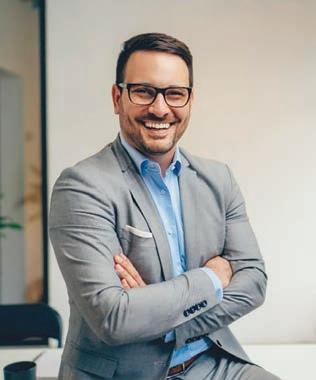
Torah Study with Temple Beth Shalom of the West Valley: 11 a.m. - noon. TBS of the West Valley’s weekly virtual study group explores that week’s portion and studies different perspectives and debates the merits of various arguments. Intended for adults, Torah study is open to students of all levels. The goal is to achieve an understanding of what the text is and what it can teach us in the contemporary world. Fore more information, contact the TBS office at (623) 977-3240.
WEDNESDAYS, APRIL 7-28
The Jews of American Jazz: 10 a.m. In this four-week virtual class, examine the lives, careers, and music of a slew of great JewishAmerican jazz legends. Topics covered include: Benny Goodman and the genesis of the Swing Era, clarinetist Artie Shaw and black stride pianist Willie “The Lion” Smith and more. In partnership with The JCC of Greater Baltimore/ The Gordon Center. Cost: $100 for 4 classes. For more information and to register, visit apm. activecommunities.com/valleyofthesunjcc/ Activity_Search/1734.
Shabbat
FRIDAYS
Congregation Beth Israel’s Rosenzweig Courtyard is holding in-person evening services limited to 30 people, excluding clergy and staff. Members and guests must be at least 10 years old. Participants must pre-register by Thursday at 5 p.m. Priority will be given to members first and then guests. If there are more requests than available seats a lottery system will be used. To make your reservation, contact Gail Gilmartin at 480-951-0323 or at ggilmartin@cbiaz.org.
Congregation Or Tzion is holding in-person Friday evening and Saturday morning Shabbat services indoors. Attendees must pre-register and attendance will be capped at 25. Participants will also have to bring a completed questionnaire with them and everybody’s temperature will be checked as they enter the synagogue. Masks will be required and seating is also socially distanced.
Beth El Phoenix is offering in-person Shabbat services indoors, limited to 30 people, not including clergy. Masks and social distancing required as well as pre-registration via bethelphoenix.com/form/Shabbat-registration or by calling the office at (602) 944-3359.
Erev Shabbat Service: 5:30 p.m. Rabbi Alicia Magal will lead a service livstreamed for members of the Jewish Community of Sedona and the Verde Valley. Cost: Free. For more information and to obtain the Zoom link, visit jcsvv.org/contact.
Pre-Shabbat Kiddush Club: 6 p.m. Say kiddush with Rabbi Mendy levertov online. Cost: Free. Tune in here: ourjewishcenter.com/virtual. For more information, visit chabadaz.com.
Shabbat at Beth El: 11-11:45 a.m. Celebrate
Shabbat with songs, blessings and inspirational teachings. Rabbi Stein Kokin from Beth El Congregation will lead us the first Friday of every month. Special guests will be welcoming Shabbat during the remainder of the month. For more information or to join, visit bethelphoenix.com.
Welcome Shabbat: 11-11:45 a.m. Join the JFCS
Virtual Center for Senior Enrichment each Friday for a soothing and inspiring program to welcome Shabbat. Each week a different guest host will lead the program with song and celebration. Cost: Free. For more information, visit jfcsaz.org/cse.
Kabbalat Shabbat: 5:30 p.m. Congregation
Kehillah invites you to join services via Zoom, April 23, May 7 and 24, with Rabbi Bonnie Sharfman and cantorial soloists Scott Leader and Erica Erman. PowerPoint slides will be viewable if you don’t have “Gates of Prayer for Shabbat and Weekdays.” Services will be held April 23, May 7 and To register and receive the link, please email, info@congregationkehillah.org.
EVERY THIRD FRIDAY, JAN. 15-DEC. 31
Third Friday Shabbat: 7- 8 p.m. The Desert Foothills Jewish Community Association hosts a virtual abbreviated Shabbat service followed by a program. Contact Andrea at 480-664-8847 for more information.
Seniors
THURSDAY, APRIL 22
The Care Partnership: 1:30-2:30 p.m. David Coon’s “The Care Partnership” event is part of the month-long series on Parkinson’s Wellness. This virtual event will focus on the care relationships between Parkinson’s patients and their caregivers and how they develop and change. Cost: Free. To register, visit apm.activecommunities.com/ valleyofthesunjcc/Activity_Search/1738. For more information, contact Jonell Mertens, Parkinson’s Coordinator for the MPJCC at JonellM@mpjcc.org.
THURSDAY, APRIL 29
Parkinson’s Mindfulness: 1:30-2:30 p.m. Debbie Harbinson’s “Parkinson’s Mindfulness” will incorporate modalities that translate the innate wisdom of the mind, body, and spirit for overall wellness and FUN! You will feel inspired and uplifted by this well thought out program. This virtual program is part of the month-long series on Parkinson’s Wellness. Cost: Free. To register, visit apm.activecommunities.com/ valleyofthesunjcc/Activity_Search/1739. For more information, contact Jonell Mertens, Parkinson’s Coordinator for the MPJCC at JonellM@mpjcc.org.

MONDAYS, MARCH 22-MAY 24
3M Movement: This Zoom class works to tone and strengthen the body to the tune of a variety of music from Latin, Pop, Broadway, Jazz, and R&B. Movements are offered in a modified format and lower intensity. Cost: Free. For more information and to register, contact seniorcenter@jfcsaz.org or call Jennifer Brauner at 602-343-0192.
TUESDAYS
Brain Games with Friends: 2-3 p.m. Challenge your brains while having fun. Experts believe that active learning helps maintain brain health by preventing loss of cognitive skills such as memory, reasoning and judgment. For more information or to register, visit vosjcc.org/j-at-home-adults.
THURSDAYS
In the Kitchen with Benita: 12:30 p.m. Join Smile on Seniors on the fourth Thursday of every month for some delicious cooking or baking fun! Cost: Free. For full details visit sosaz.org/virtual or email Rabbi Levi Levertov at levi@sosaz.org.
FRIDAYS
Musical Friday: 12:30 p.m. Join Smile on Seniors on the first Friday of every month for a musical presentation. Cost: Free. For full details visit sosaz.org/virtual or email Rabbi Levi Levertov at levi@sosaz.org. JN
Upcoming Special Sections
Senior Lifestyle
May
From home health aides to financial planners, independent living facilities to nursing homes, this is the perfect venue to showcase how your business can help older Jewish residents navigate these challenging times.
Summer Cool
JEWISHAZ.COM JEWISH NEWS APRIL 16, 2021 21
JEWISHAZ.COM REACH HIGHLY EDUCATED, AFFLUENT READERS IN THE VALLEY
your sales consultant to schedule your advertising at jlipson@jewishaz.com
Contact
7
21
look at ways for families to stay cool this summer from staycations and getaways to safe indoor activities. Print | Digital | Target over 42,500 Jewish readers with a mix of print and digital. Ask e Expert May 21
devoted to the Valley’s dominant industries, economic trends and innovative entrepreneurs publishes monthly. Ask the Expert allows local business people to share insight from their field of expertise.
May
A
Content
Virtual seder
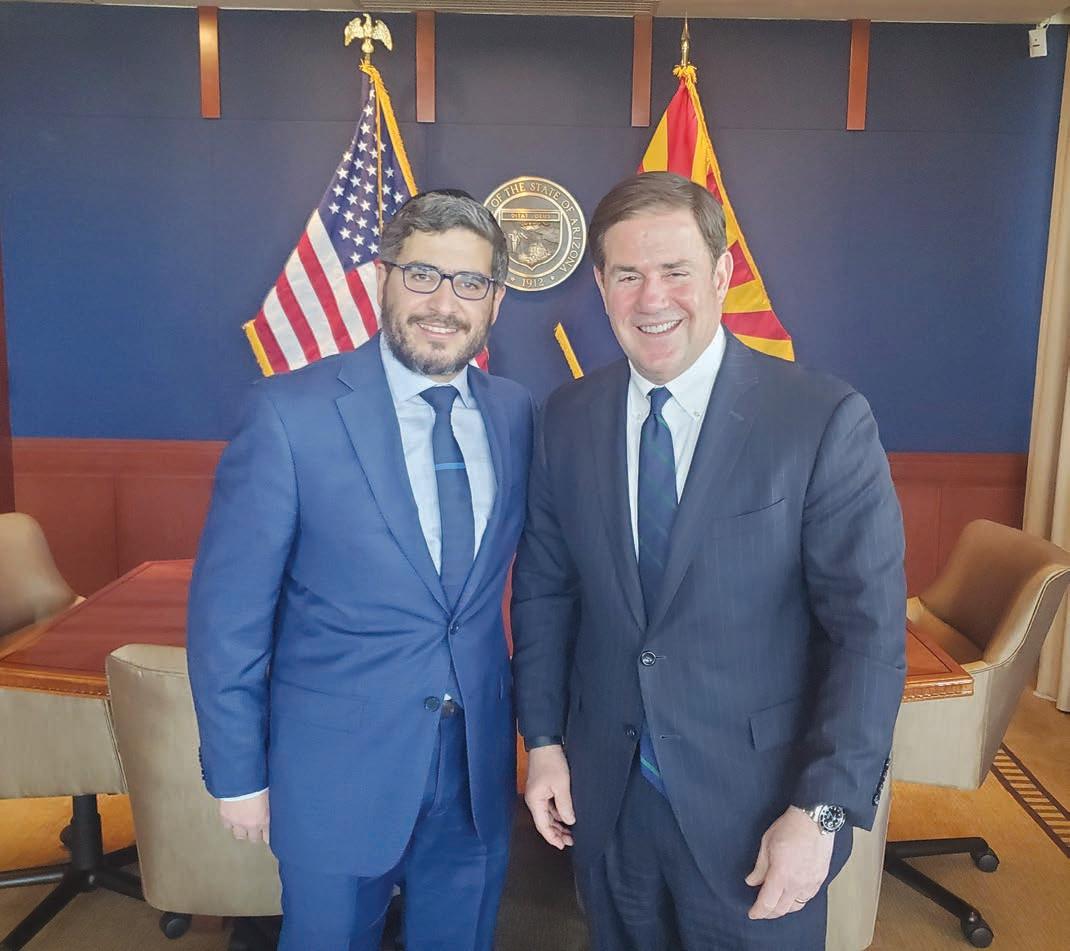
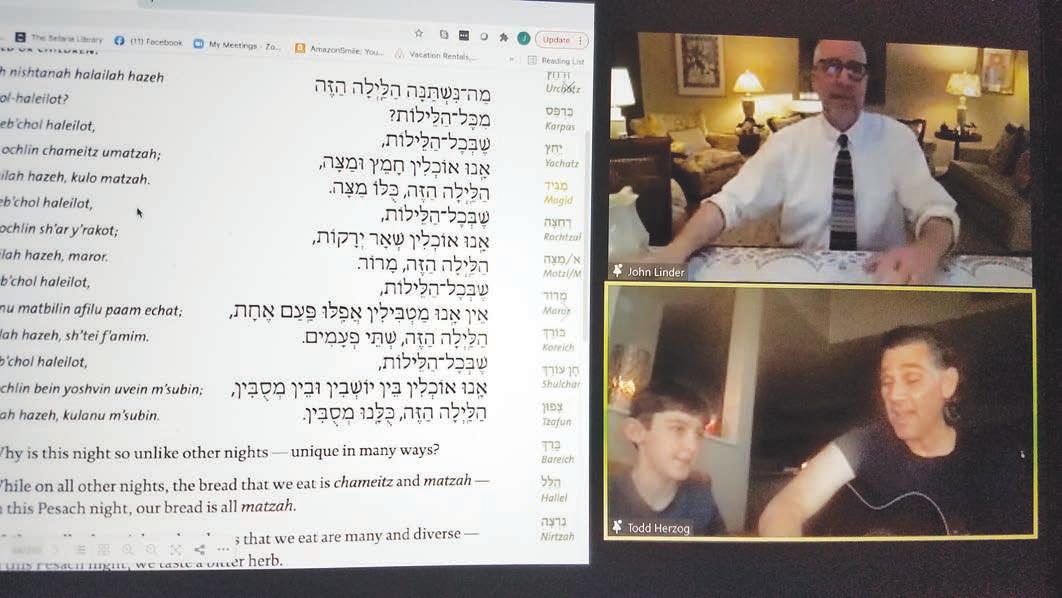

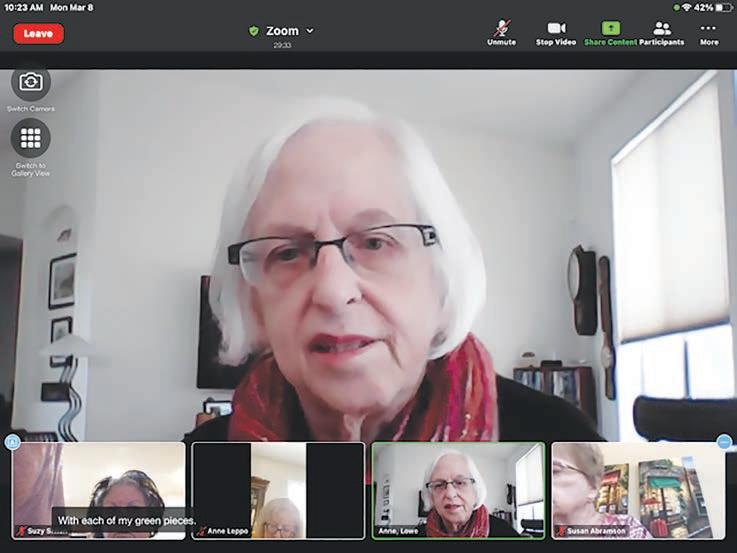
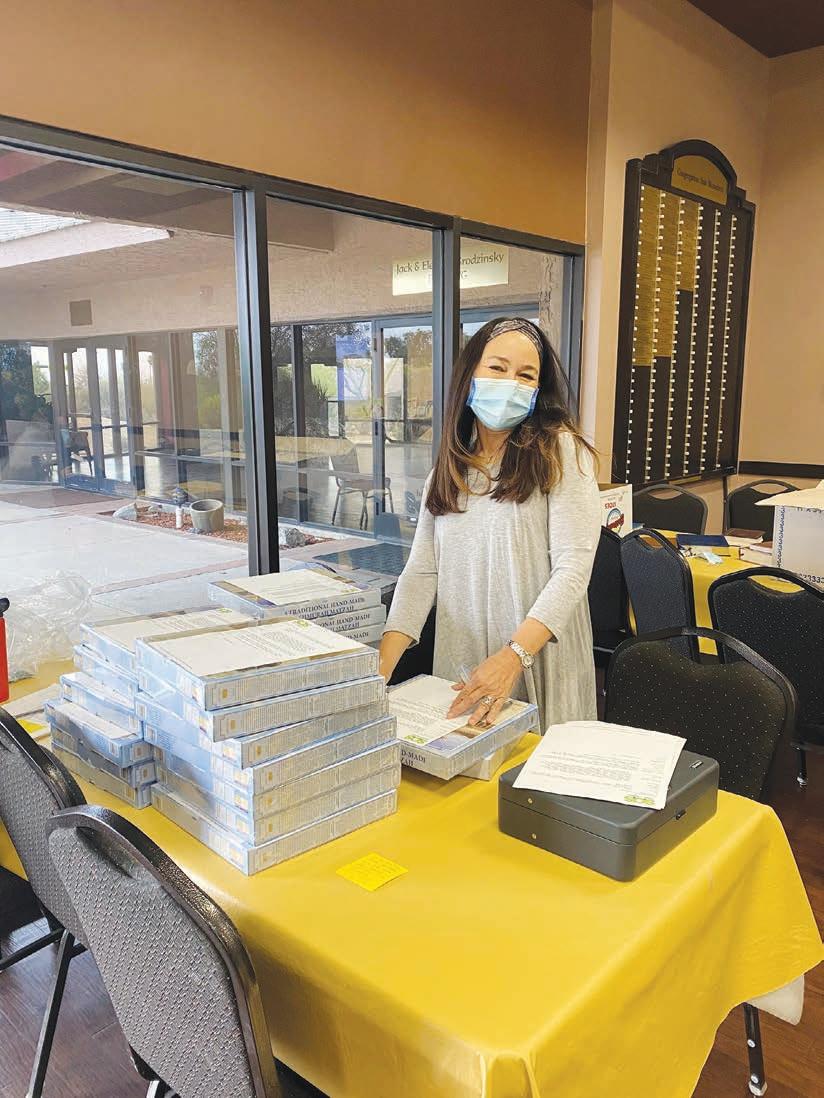

Beauty in a tea bag
‘Broken World’
COMMUNITY
COMMUNITY page features photos of community members around the Valley and the world. Submit photos and details each week to editor@jewishaz.com by 10 a.m. Monday.
This
Rabbi Pinchas Allouche met Gov. Doug Ducey last month and was asked to convey the governor’s best wishes for a Happy Passover to the Jewish community of Arizona and Jewish people everywhere.
PHOTO BY RABBI PINCHAS ALLOUCHE
Temple Solel’s annual — and virtual — Second Night Community Seder this year was led by Rabbi John Linder, Rabbi Debbie Stiel and Cantorial Soloist Todd Herzog.
Beth Ames Swartz, local artist, adds water to adjust the density of black paint applied over the background on an evolving canvas in her new series “Broken World.”
PHOTO COURTESY OF BETH AMES SWARTZ
Anne Lowe, an artist from Tucson, introduced the ladies of Hadassah Tikvah West Valley to the joys of folding tea bag paper into flowers last month.
22 APRIL 16, 2021 JEWISH NEWS JEWISHAZ.COM
PHOTO BY ANNE LEPPO
Research of 1,426 American Jews found only 4% of non-Orthodox Jews and 5% of Orthodox Jews do not plan to get vaccinated.
Harrison does allow that there is misinformation floating around, and said that Orthodox people are nervous about the COVID vaccine because it’s so new.
“The problem is with this specific COVID vaccine,” she said. “There are some people who are not getting the right information — they’re not on social media, they don’t have televisions.”
MILESTONES
But she pointed out that the teachers at Torah Day School, where her kids attend, were vaccinated.
And she’s vigilant about getting the vaccine message to people in her Orthodox community who might not have access to vaccine information.
As someone very active on Twitter, she’s also been reaching out to people there who may be confused.
Misinformation can be “like a game of telephone,” she said. “You’re always trying to get the whole message right.” JN
A. David Silverman, 83, peacefully passed away on March 2, 2021, in Peoria at 11:47 AM.
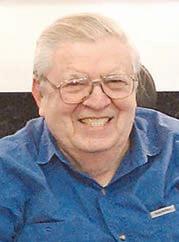
David, also known as King David, joined the Air Force in 1958 and served in the Middle East on flight lines and in personnel. He conducted Friday night services for a year and was a man of deep faith and knowledge.
David worked for the Navy in Groton, Connecticut and was promoted to Quincy, Massachusetts where he met his bride, Iris, of 49 years. He was gentle, kind and a very positive person.
In 1973, he moved to Phoenix with his beloved wife, Iris, to work for the Federal Housing Administration. They joined Beth Hebrew Synagogue, and Dave was president for 44 days when it merged with Temple Beth El on March 28, 1984.
David joined Make-A-Wish® Arizona at its inception and helped to raise money for it. He graduated from University of Phoenix with a Bachelor of Science in Business Administration in 1982. David was a member of Beth Emeth Congregation in Sun City West for over 25 years, and he participated in services and worked hard to raise money for the synagogue. As an avid baseball fan, David’s signature was on the petition to have a major league baseball team in Phoenix. When he met anyone, he would ask for their birthday or anniversary and when they met again, he would remember those dates.
Arielle Rose Kutz becomes a bat mitzvah on April 17, 2021, at Congregation Or Tzion. She is the daughter of Elana and Larry Kutz of Scottsdale.
Grandparents are Jesse Cohen of Phoenix and the late Joni Cohen; Karen Lloyd of Philadelphia, Pennsylvania; and Bridget and Ron Kutz of Columbus, New Jersey.
For her mitzvah project, Arielle created “Melodies for Marine Mammals,” a free virtual concert for hope and healing to raise funds for the Pacific Marine Mammal Center in Laguna Beach, California.

A student at Cocopah Middle School, Arielle enjoys musical theater, dance, tennis and student council.
David enjoyed a variety of music. He sang in the chorus of the SCW Variety Show, the Freedom Plaza Chorus and was a member of a harmonica band. Music was a large part of his life. He always knew the right words to cheer, console or comfort a person or just said hello with a big smile. He never complained despite having some major medical issues.
He is survived by his wife, Iris; his sister, Adelle (David Gordon) of New York, New York; his uncle and aunt, Sumner and Joan Sheff of Scottsdale; and many nieces, nephews and cousins. He was the sixth of seven siblings, five of whom preceded him in death. David will be missed.
Donations may be made to a charity of your choice, Make-A-Wish®, 2901 N. 78th St., Scottsdale, AZ 85251 or Beth Emeth Congregation of the West Valley, 13702 W. Meeker Blvd., Sun City West, AZ 85375.
The funeral was privately held at National Memorial Cemetery with services conducted by Rabbi Sholom Lew. Arrangements were made by Regency Mortuary & Crematory, 9850 W. Thunderbird, Sun City, AZ 85351.
Addi Mae Higashi was born March 17, 2021. She is the daughter of Ashley and Aaron Higashi of Scottsdale. Grandparents are Julie and Bruce Sohn of Paradise Valley. Addi has two siblings, Amira, 4 and Aria, 2.

Lorraine Greenberg, 89, passed away on April 6, 2021, in Scottsdale. She was born in Milwaukee, Wisconsin in 1931. She graduated from the University of Wisconsin with a degree in music education. Lorraine devoted her entire life to music, as a high school music teacher, community theatre musical director and, most closely to her heart, Jewish congregational choir director.
After moving to Phoenix in 2001, she became actively involved with the choirs of Congregation Beth Israel and, more recently, Beth Ami Temple. She continued to provide adult piano lessons until the week before she passed away.
Shira Elisheva Rosengard was born April 3, 2021. She is the daughter of Julia and Avi Rosengard of Phoenix. Grandparents are Sandy and Edward Zeldovich of Wauconda, Illinois; and Drs. Lola and Richard Rosengard of Phoenix.

Lorraine is survived by her daughters, Lisa Luber (Howard), Sara Puchinsky (Dale Grabois); her grandchildren, Rachel, Adam, Danny and Temira; and twin great-grandchildren, Jacob and Jordyn. Graveside services were held at Mt. Sinai Cemetery where she was laid to rest next to her ex-husband and life partner.
David Morris Rabenowitz, 82, passed away on April 3, 2021 in Scottsdale. David was born in Phoenix to Rena (née Carlisle) and Harry Rabenowitz. He attended West Phoenix High School and then went on to attend the University of Arizona. He moved to Los Angeles, California in 1960 to attend dental school at the University of Southern California. Following dental school, he served in the U.S. Army practicing dentistry at Fort Gordon in Augusta, Georgia. He continued his dental practice for 52 years in Los Angeles and Phoenix. He was an avid golfer, lover of the arts, books, opera, movies and his dogs and cats. He volunteered for many years doing dentistry for various underserved communities.
Marshall Alexander Schneider was born April 6, 2021. He is the son of Alexandra and Richard Schneider of Paradise Valley.

Grandparents are Robin and Harlan Schneider; and Debra Christy and Raymond Merriman. Marshall has one sister, Gabriella Rose, 1. JN
He is survived by his wife Anita Stein Rabenowitz; two children from his first marriage, Ryan Shelby (Chris) and Jana Wallack (Perry); two stepchildren, Stephen Berger (Rebecca) and Ben Berger (Rachel); and two grandsons and nine granddaughters. He was deeply loved by many friends from childhood to the present, actively involved in the Temple Chai community and will be missed by those who knew and loved him. In lieu of flowers, the family requests donations be made to Temple Chai in Phoenix; Hospice of the Valley - Eckstein Center; or to support asylum seekers through VBM –please indicate donations are for Arizona Jews for Justice’s asylee support program.
ARIELLE ROSE KUTZ
JEWISH NEWS APRIL 16, 2021 23
TRIAL CONTINUED FROM PAGE 4
BAT MITZVAH
PHOTO COURTESY OF THE KUTZ FAMILY
PHOTO COURTESY OF THE HIGASHI FAMILY
PHOTO COURTESY OF THE ROSENGARD FAMILY
PHOTO COURTESY OF THE SCHNEIDER FAMILY



















































































































































































































































































































































































































































































































































































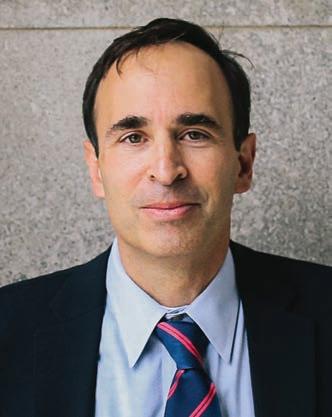































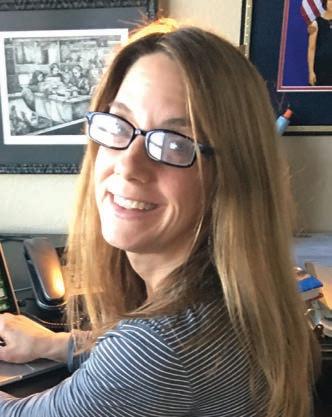
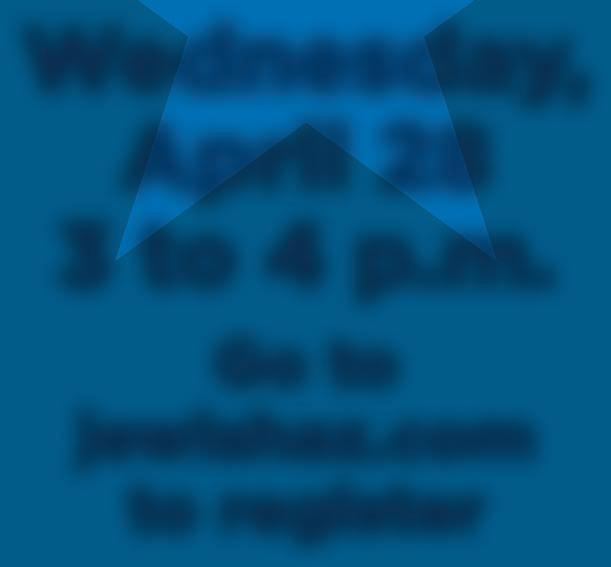








































































24 APRIL 16, 2021 JEWISH NEWS JEWISHAZ.COM Submit your questions ahead of time to rsolomon@jewishaz.com, then tune in to our Zoom webinar on April 28 at 3 p.m. HERE’S WHO WE ARE A look at the results of the Jewish Population Study KEN GOLDSTEIN Arizona State University Visiting Professor SHANNON LEVITT Jewish News Managing Editor Join the Jewish News, Arizona State University and the Jewish Community Relations Council in a discussion on the results of the Jewish Population Study. Managing Editor Shannon Levitt and Professor Ken Goldstein discuss the results of the 2019 Jewish Population Study and how it shapes the future of the Jewish Community in Greater Phoenix. The survey was conducted by Arizona State University with the assistance of visiting research professor Ken Goldstein. Wednesday, April 28 3 to 4 p.m. Go to jewishaz.com to register SPONSORED BY:















































































 MARVIN BERRIS
MARVIN BERRIS






 ISABELLA LEFKOWITZ-RAO | CONTRIBUTING WRITER
ISABELLA LEFKOWITZ-RAO | CONTRIBUTING WRITER






































































































































































































































































